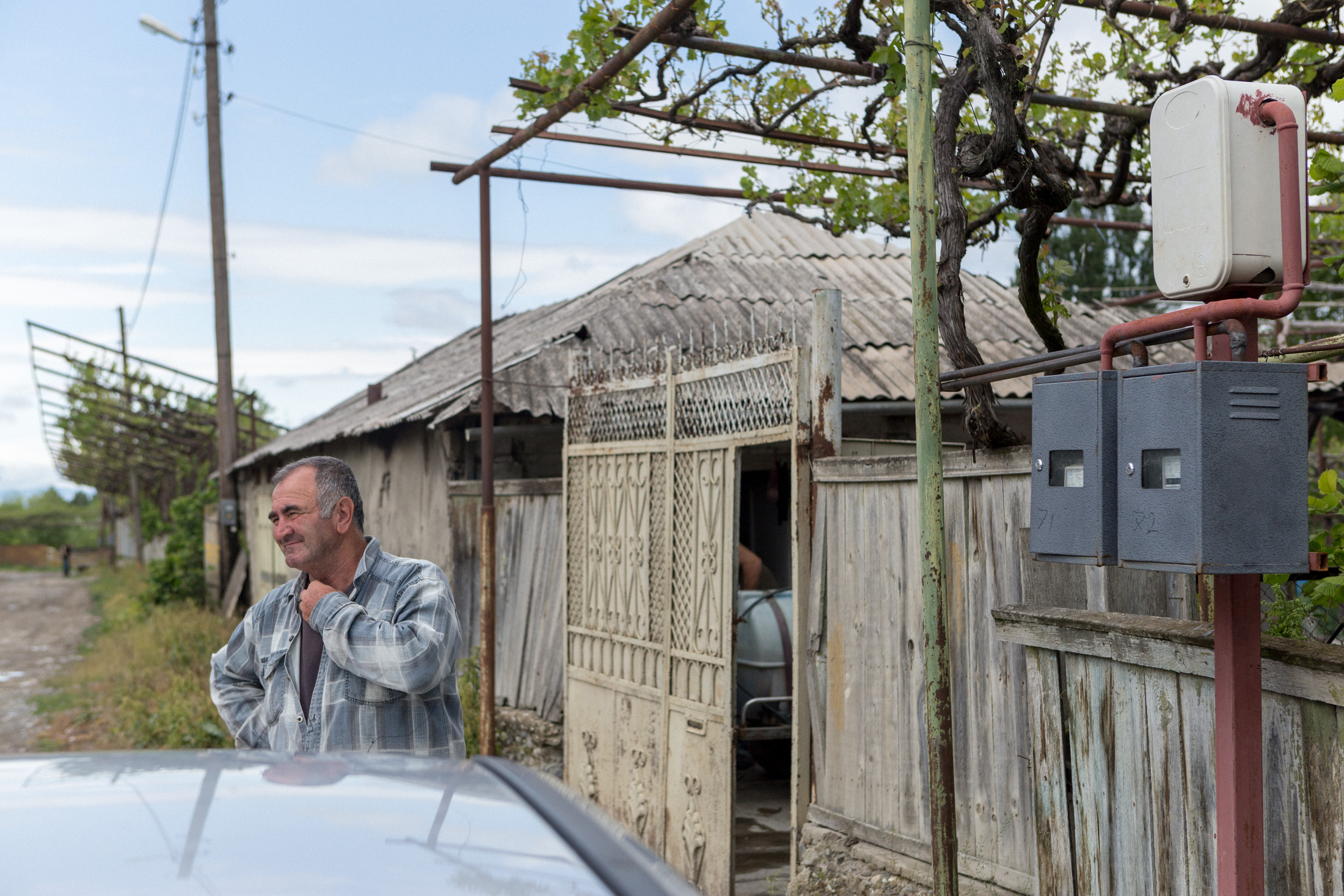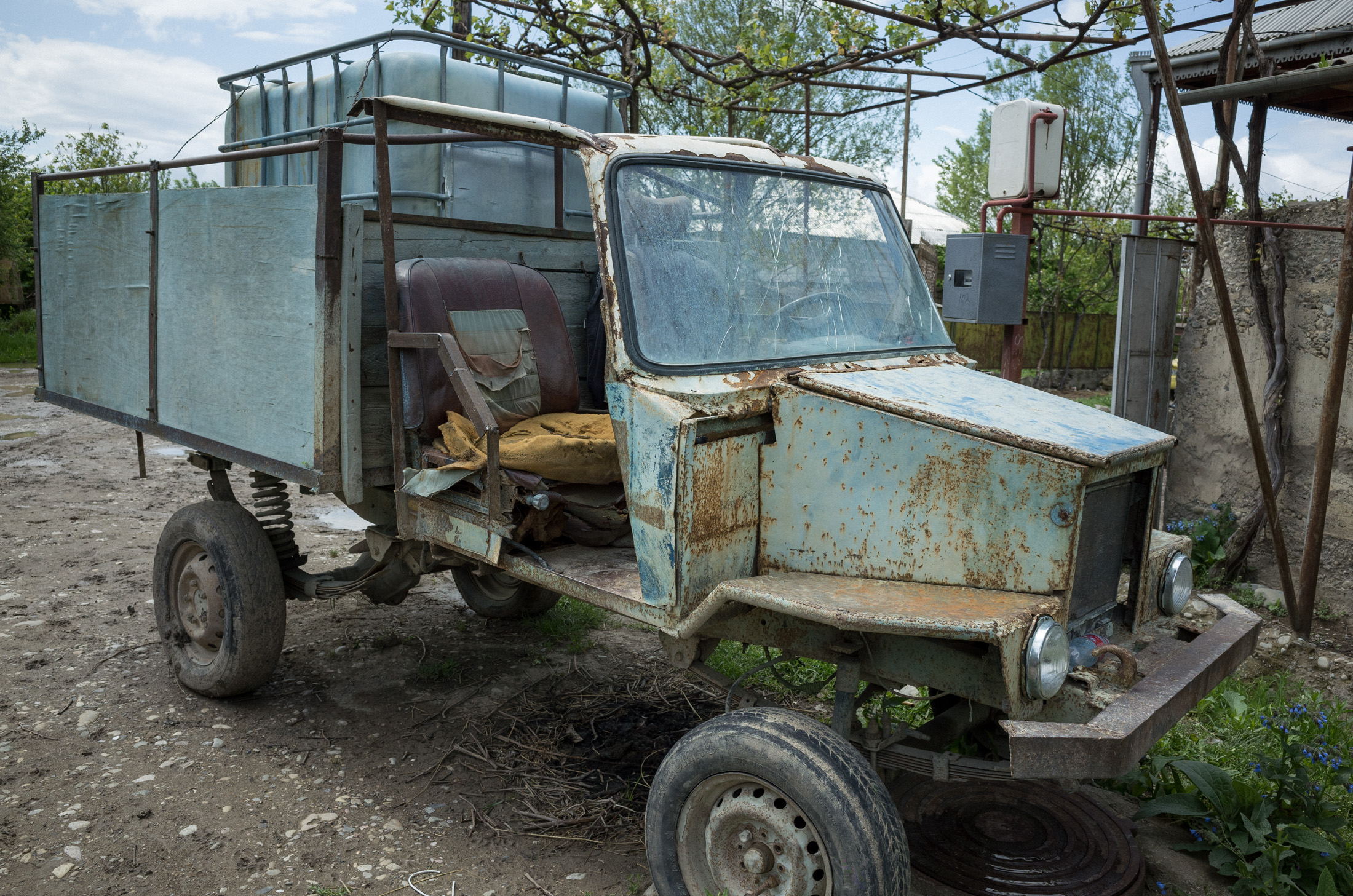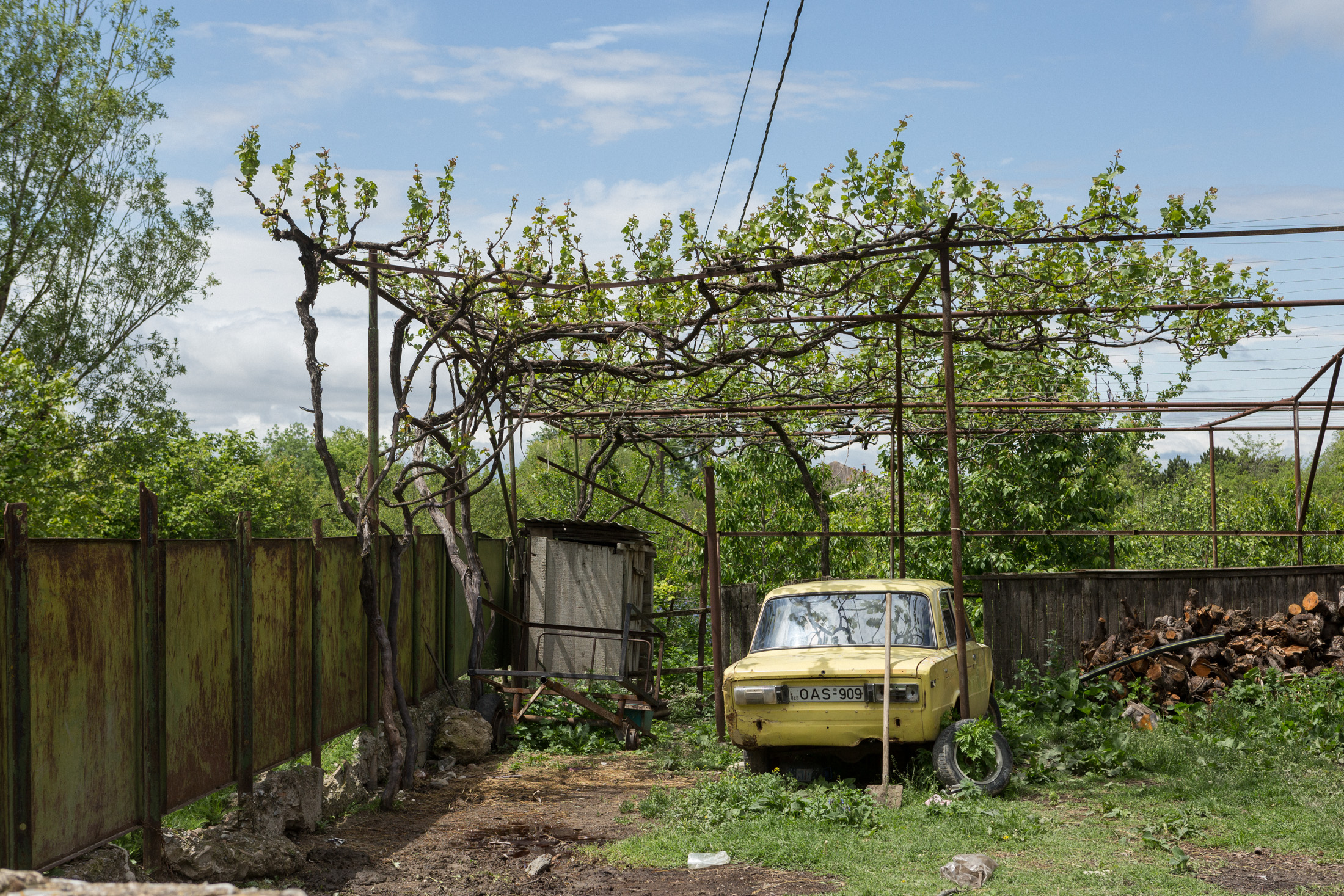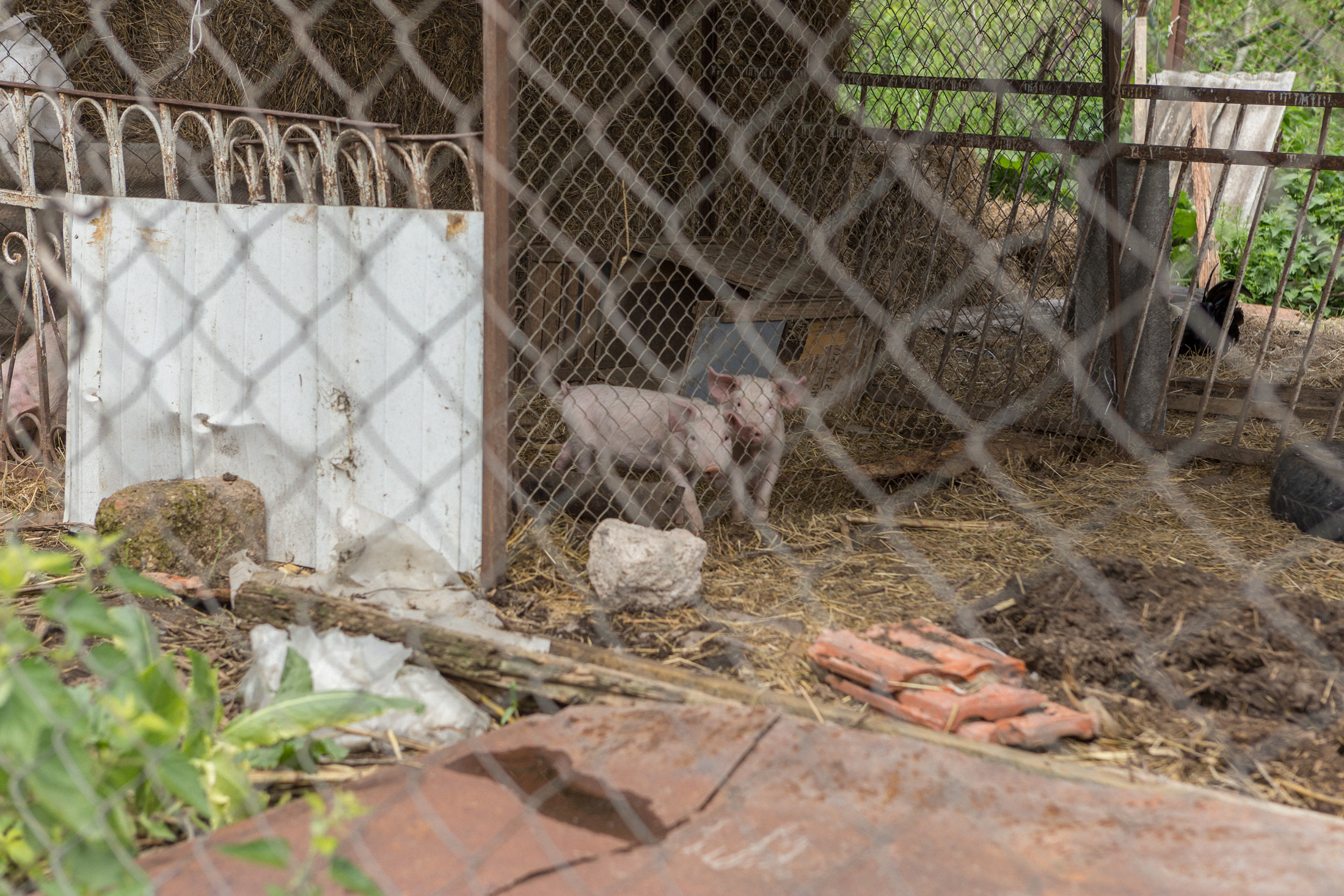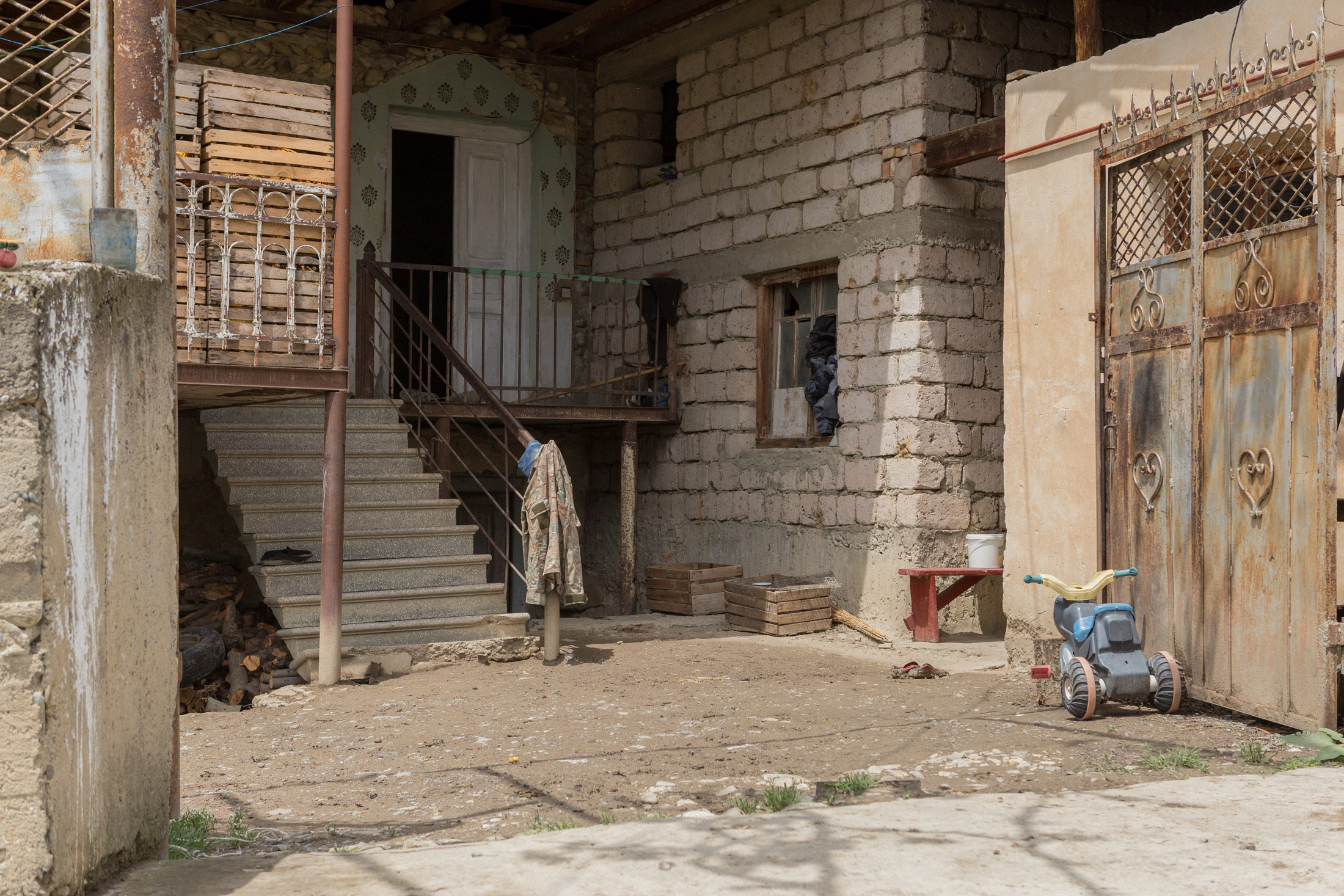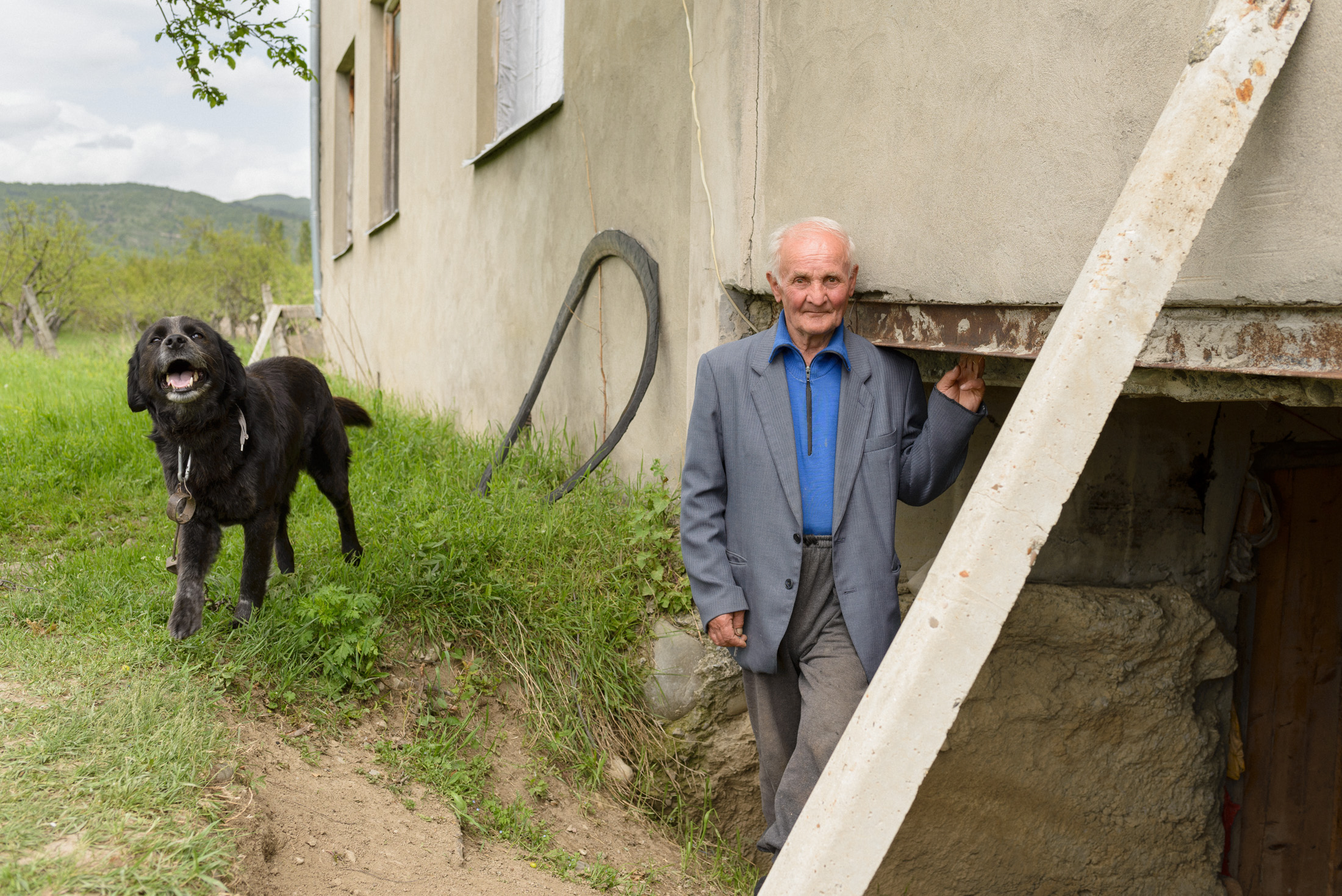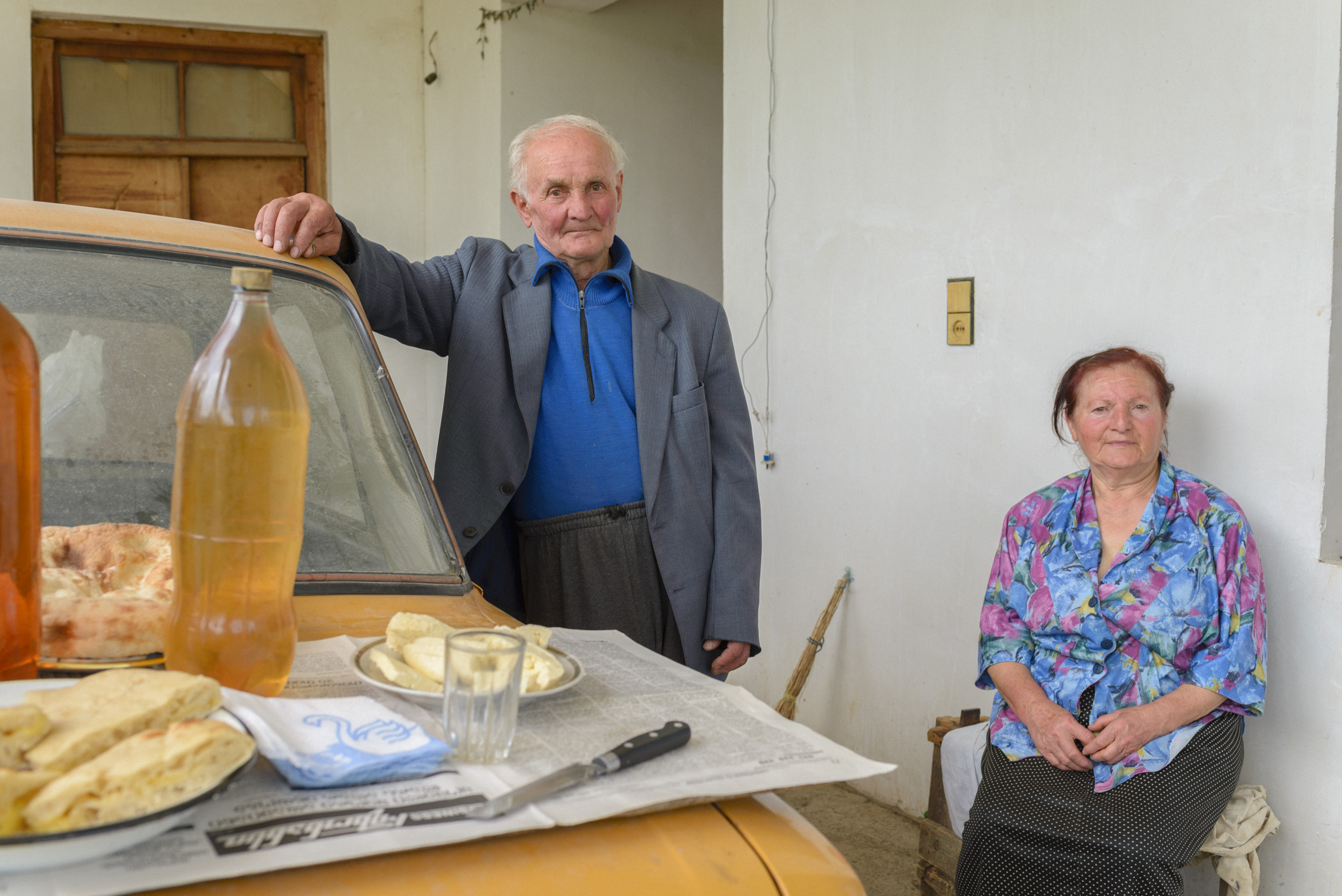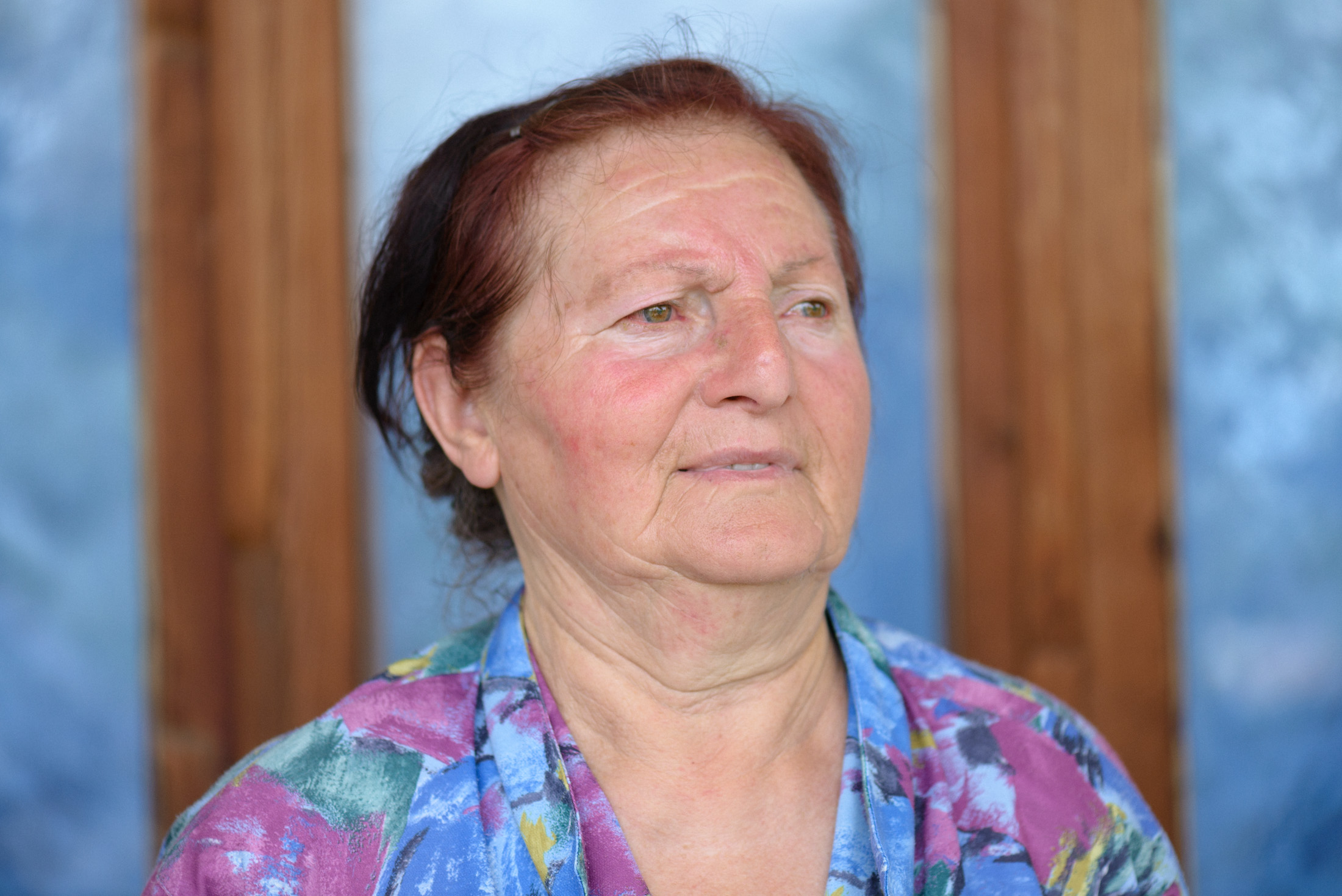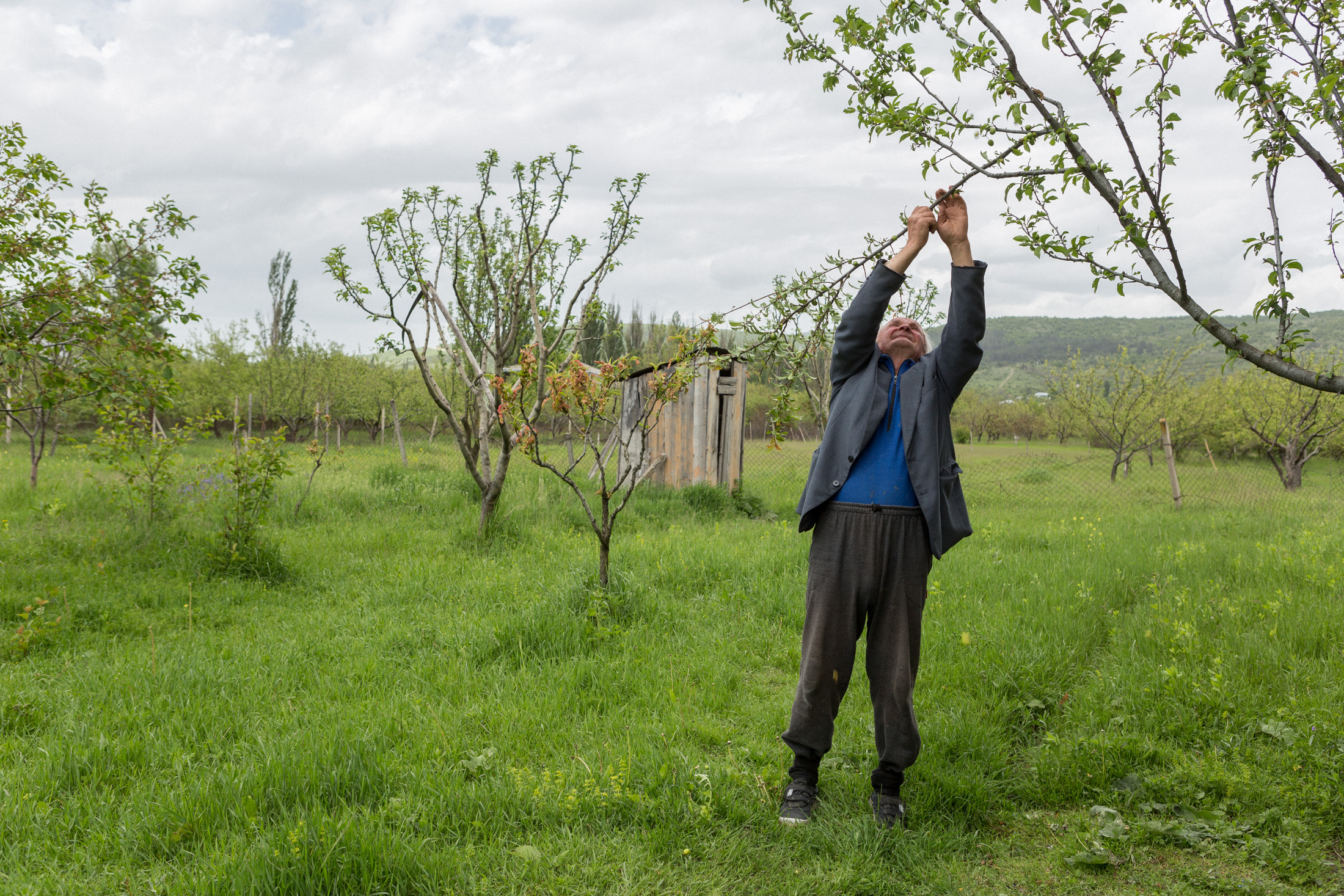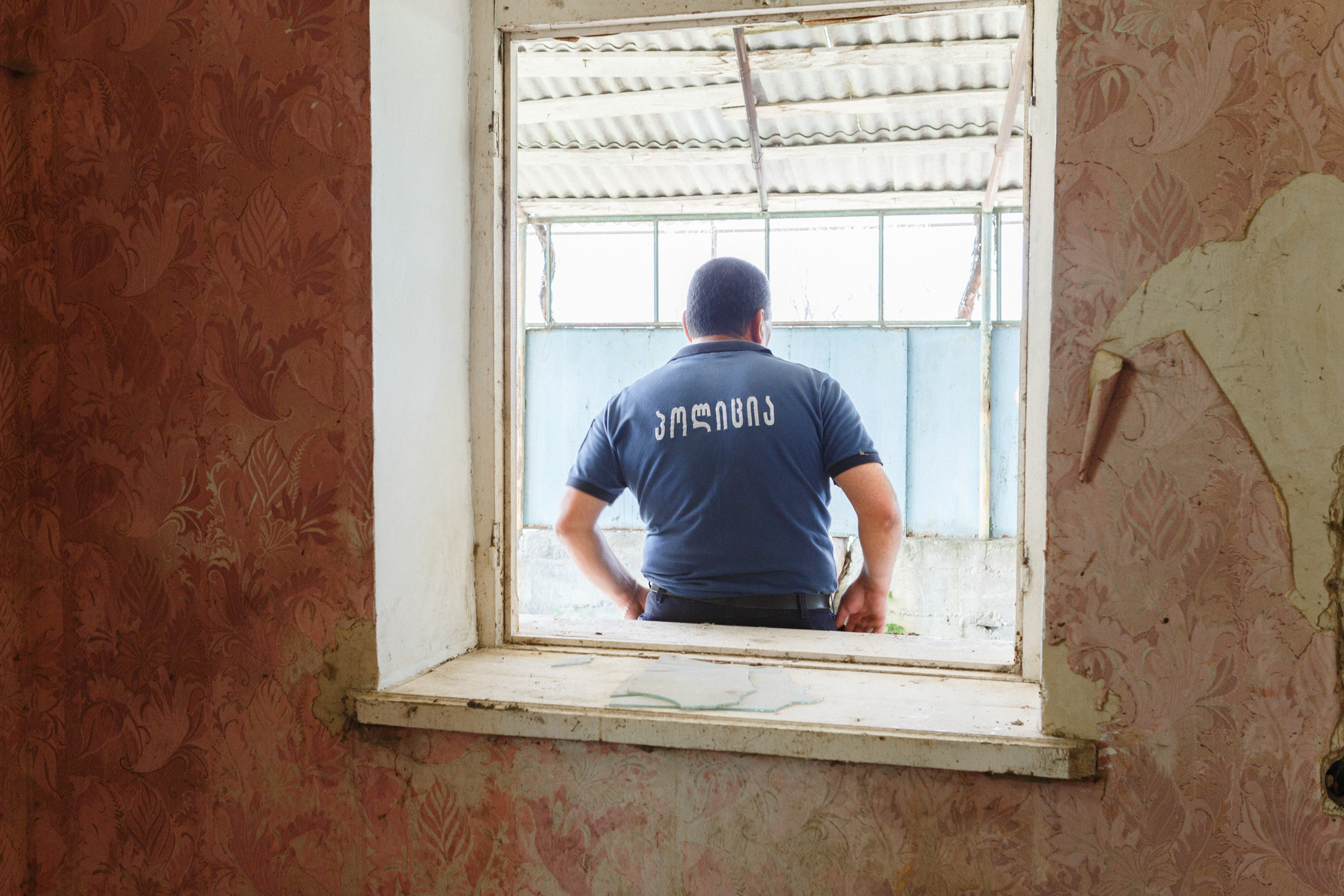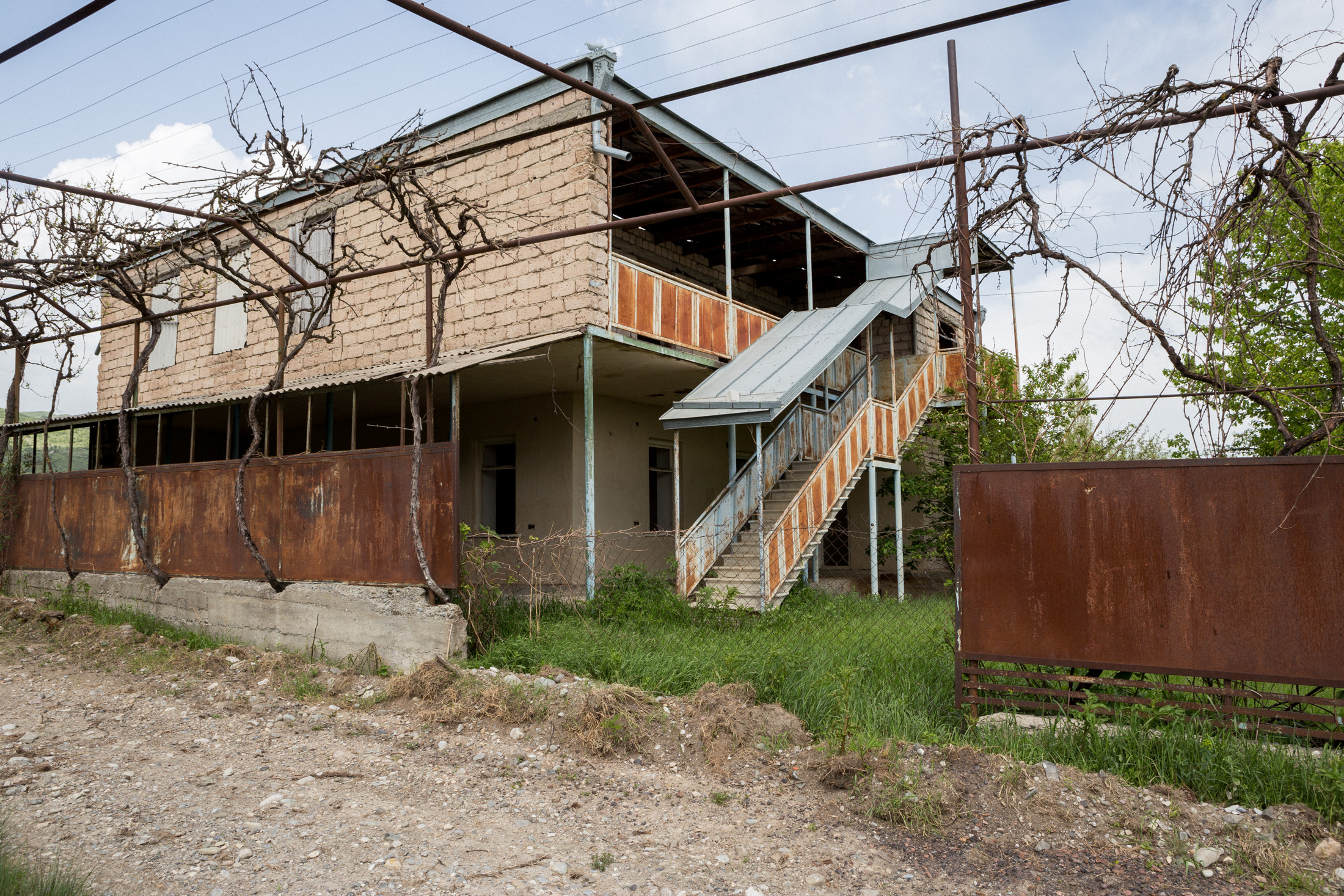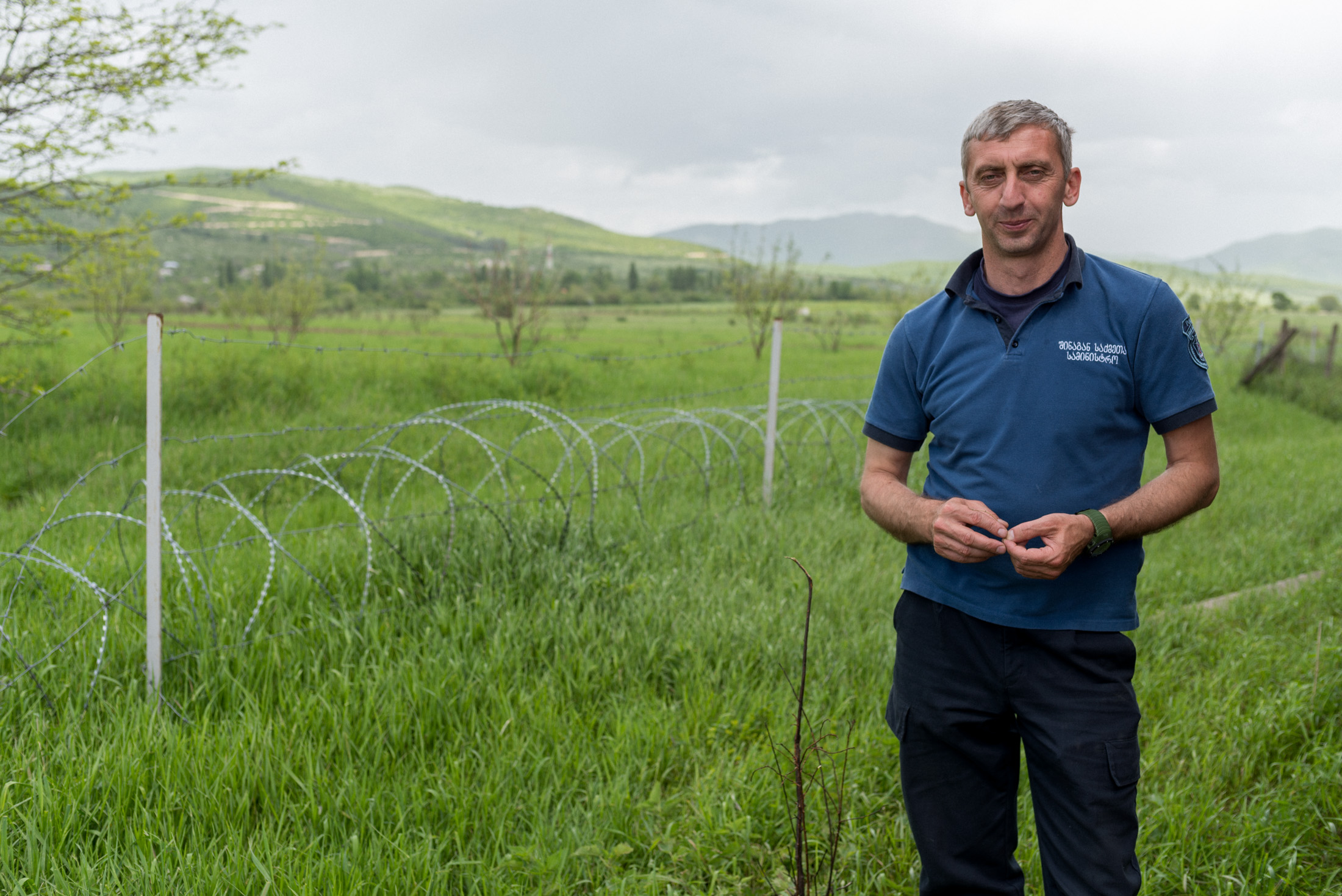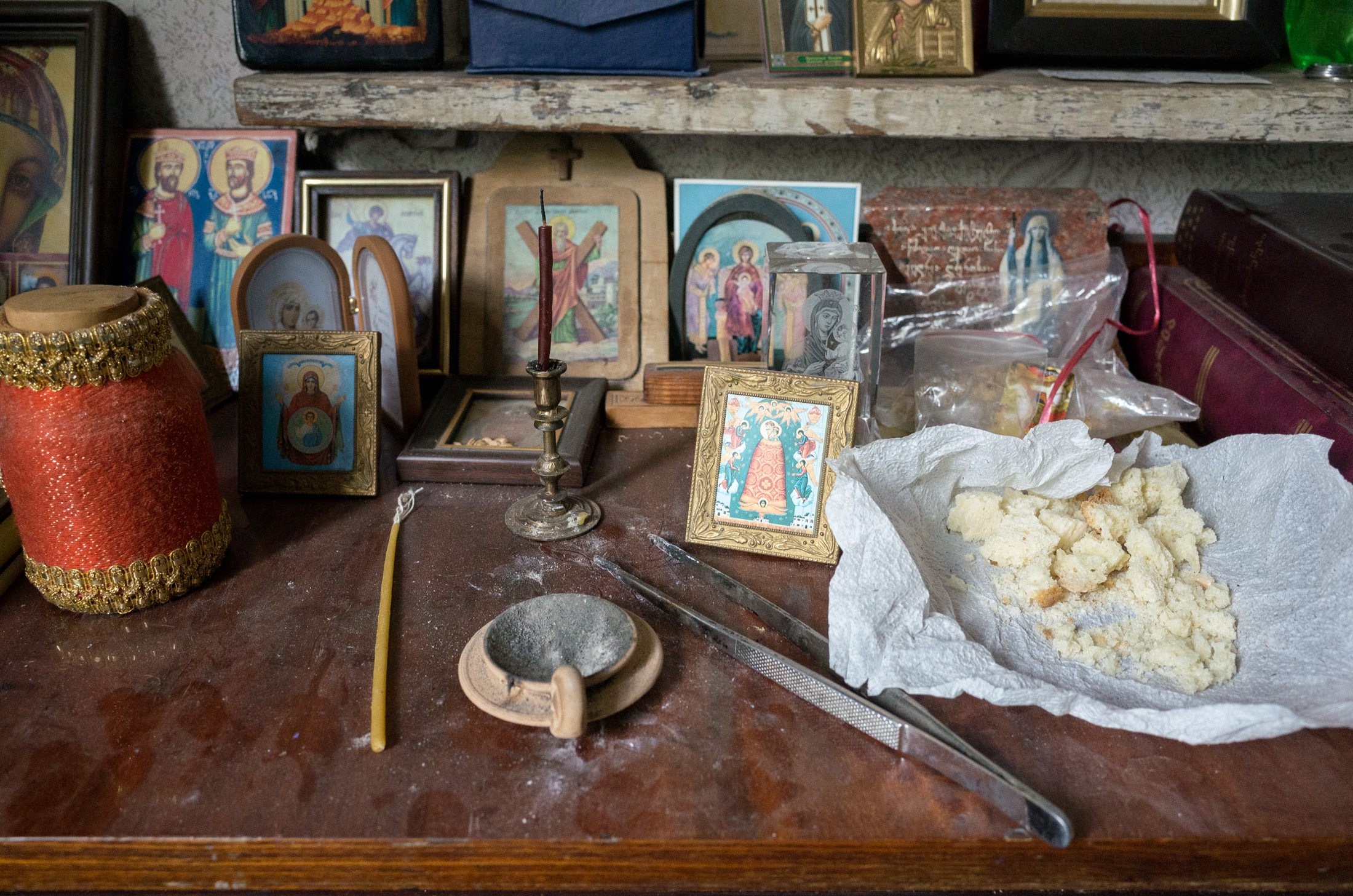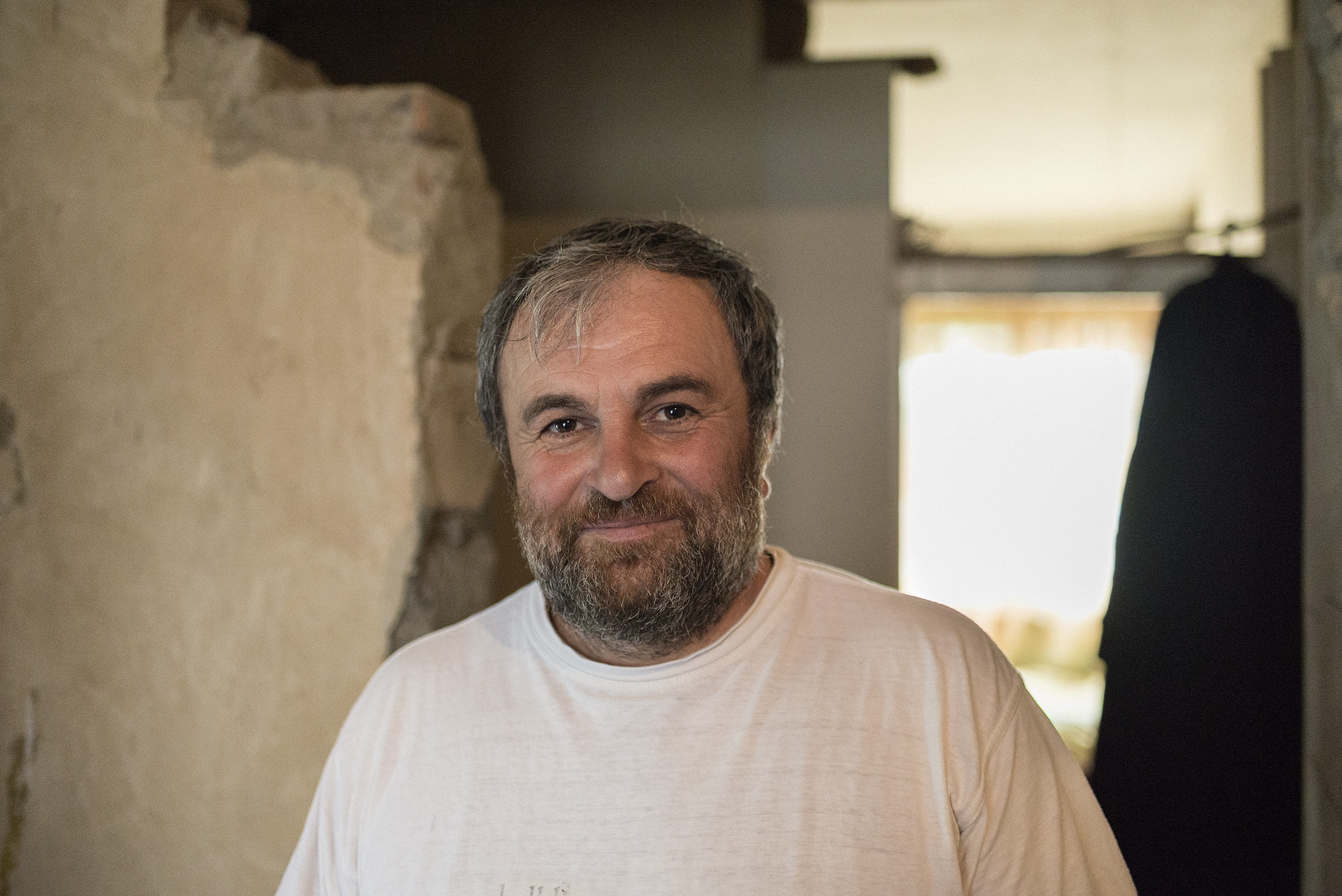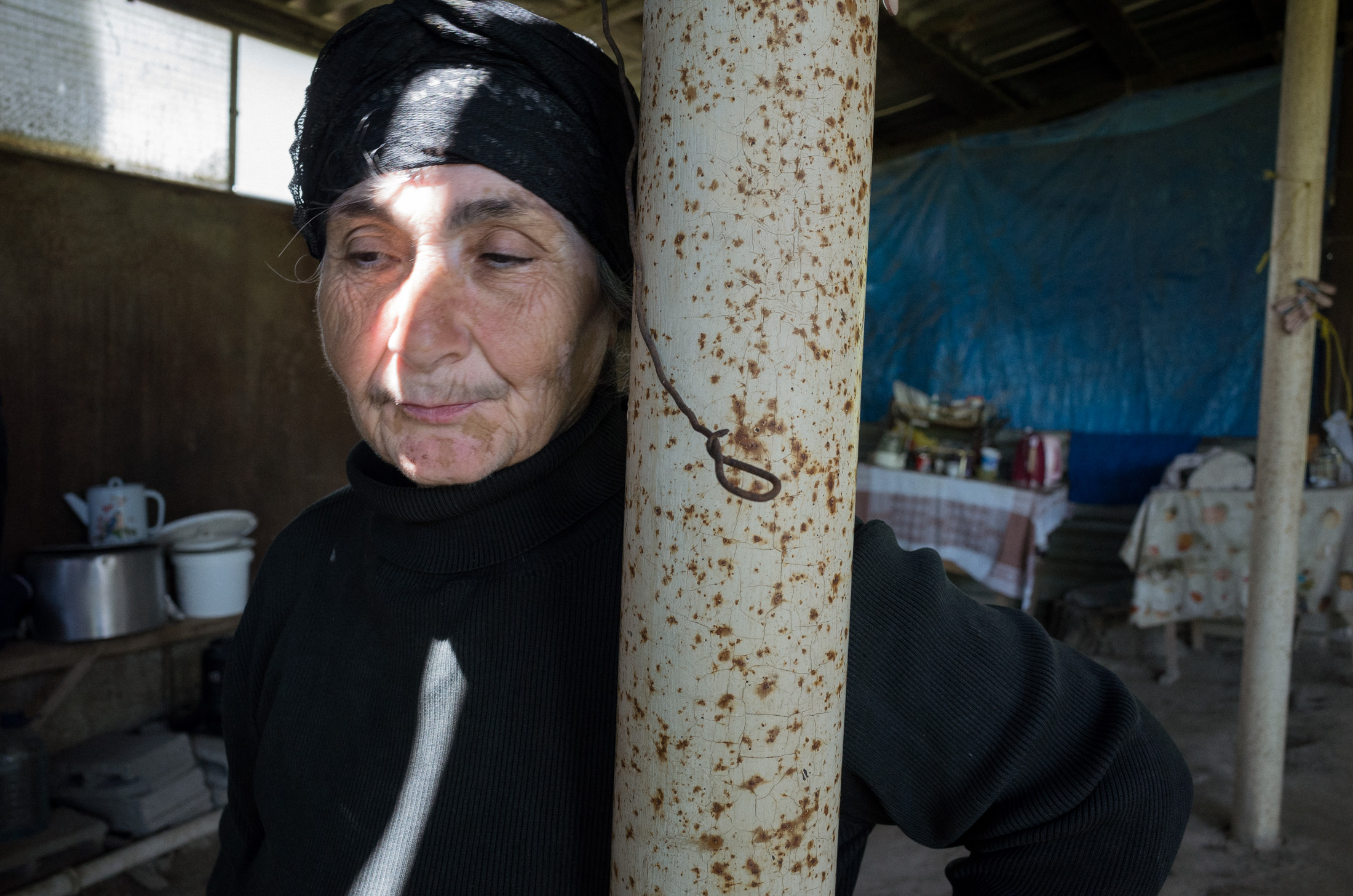Project Description
Armed conflicts happen every day in this world. Because of modern media the news reach us within a few minutes. Still there are disputes no one is talking about – although it should be done. For example the fact that Russia is sneakily annexing parts of Georgia. In 2008 Georgia intended to gain the control over the taken areas Abkhazia and South Ossetia. This military exercise ended in an armed conflict in which Russia maintained the upper hand. On both sides several hundred people died. More than 20,000 civilians had to leave their hometowns.
The EU intervened and ended the conflict after five days. They declared armistice. Russia recognized the two areas as sovereign states, this lead to the ending of a relationship between Russia and Georgia. Georgia finally has gained independence with the discontinuation of the Soviet Union in 1991. Nevertheless they have problems reaching their goal to become a member of EU and the NATO and to cut themselves off from Russia. As long as Russia has that much authority over them, the participation will stay impossible. Until today the border between Georgia and the occupied areas of Abkhazia and South Ossetia is slowly moving.
The border from South Ossetia — about 60 km long — is the reason for the loss of Georgian territory and the homeland of many Georgians. So far more than 200,000 Georgians are refugees in their own country. The wire mesh fence prevents the communication between Ossetians and Georgians. Georgians may not pass the border or they are sentenced to jail. South Ossetia is closed for international tourism.
The Georgian government cannot guarantee any longer the security for people going there. Therefore it is not advisable to go there. Additionally unmarked land mines can be found in uninhabited territory. The missing interest of the politics and the media regarding the current events leads to stagnation on the Georgian side. Only 2 years Russia already annexed the Crimean peninsula. Georgia now is facing the same fate.
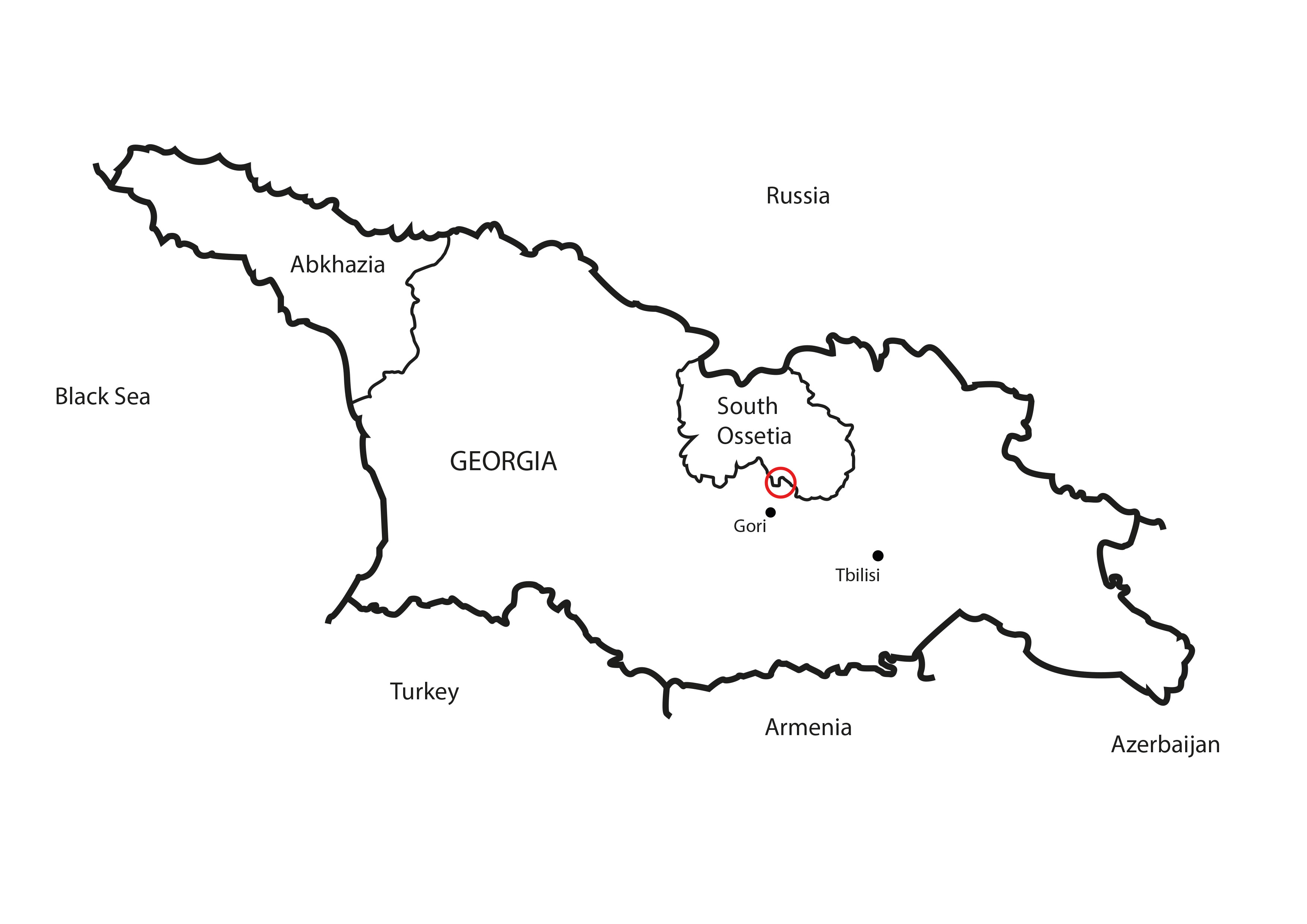
Jariasheni is located in the red circle. 20 kilometres in the north of Gori.
Jariasheni has a population of 300 hundred people. The village is located in the government area Shida Kartli, 20 kilometres in the north of Gori. South from the border there lies the village. By now it is almost completely controlled by the Russians. The last time the border fence was moved was in April this year. The movement was only 100 metres into Georgia, but it can happen again at any time.
It happened over night, so that many habitants woke up the next day to realize they have lost their ground and fields. In total the habitants’ access has been restricted to about 30–40 hectares. In average the border is moved several times a year. The exchange between the habitants and the soldiers happens on location when the soldiers are working or patrolling on the border. The communication is working between both sides. But that does not give the habitants the right to intervene.
In the course of the last drawing of borders armed soldiers have cut down apple trees on the field but also in the gardens of the people. Furthermore they have built a fire exit on the ground for the case of an emergency – as they say.
The habitants cannot defend themselves against the ongoing events. It just happened that their ground now lies on Russian territory. They have to deal with it. The field is representing the border zone. It is signalizing the change of territory and is giving the soldiers the possibility to patrol on proper streets. In fact there is no sign of a state border there, but it is one.
Stepping too far on the field may lead to an arrest. Whether it is tagged as a border or not. The linear distance to the real and marked border is about 400 metres.
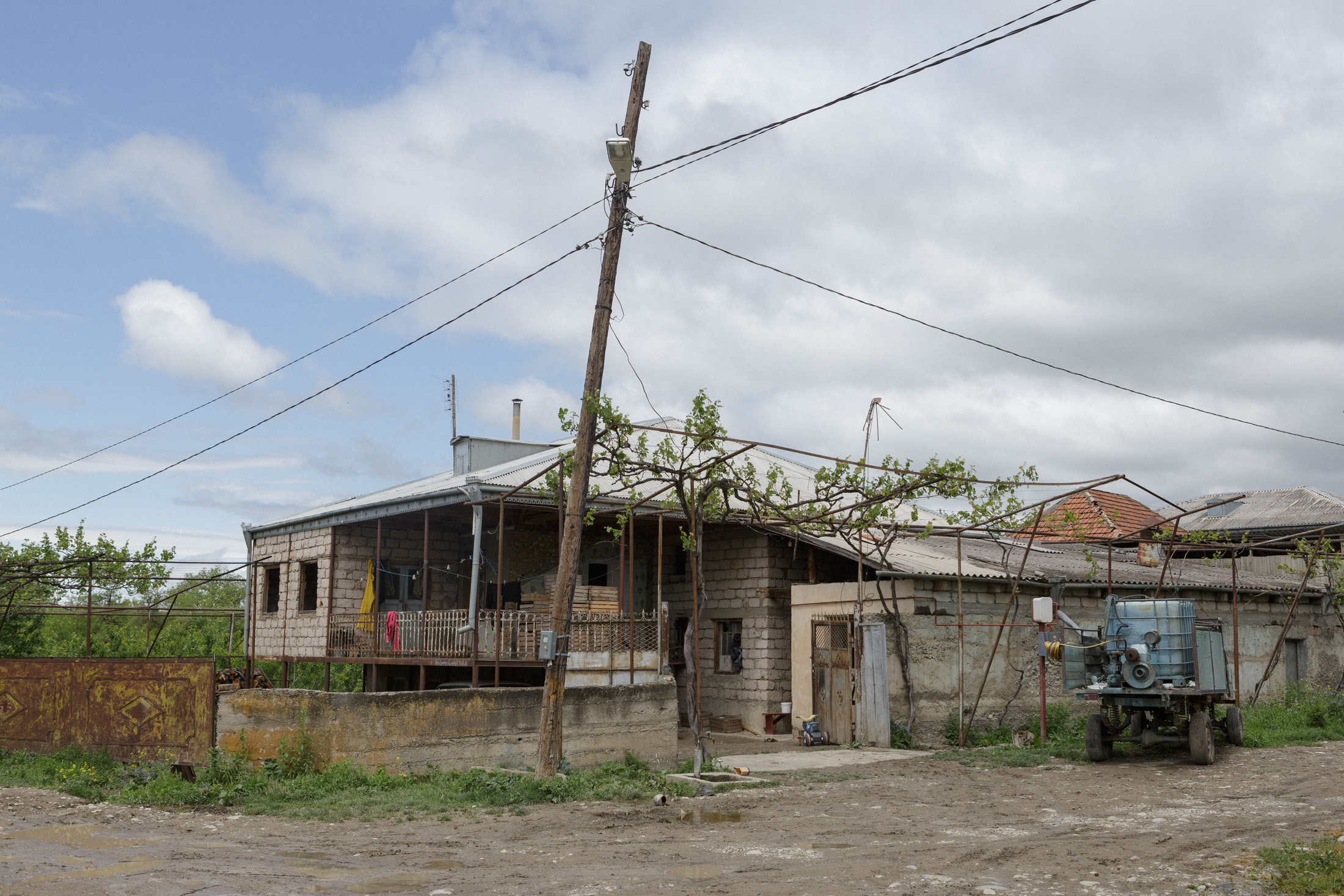
A typical house in Jariasheni.
One main road is connecting the village in the west with the bigger place Mejvriskhevi. The police station is located there. To the east the road is ending because the occupation zone is starting there. The area of Jariasheni is approximately a circle and has a radius of 500 metres. In the centre is a market place with the local church and an empty house with a bench in front of it. It reminds of a bus stop made of cement. Some small street are leading into the village where the house of the people stand.
The streets are plain gravel paths. Neither they have fixed roadsides nor are the streets paved. Also the houses are in a basic condition. For example the walls of the houses are not plastered and even sometimes they are only provisionally protected from the rain. Most of the groceries are earned by the peoples themselves. They are keeping animals like pigs, chicken and cows and are growing their own fruits and vegetables. In the village itself there is not a grocery store. To make purchases they have to drive Mejvriskhevi or Gori – which is already about 30 minutes away.

The whole villag is meeting at the market place. Inhabitants and police men.
Everyone is coming together at the market place. It is — except for the church — the only public meeting point for the people of Jariasheni. Young and old, habitants and police men. People know each other. Especially due to the high presence of the local police the people in Jariasheni become a better feeling in their everyday life. The police is always there, gives new information and are talking to the Russian side. The contact to the police men is very important for everyone. The old man often are sitting on the bench or are playing domino. They are exchanging news. The younger boys are coming to the place to ride their bicycles in the near meadow.
One of the old men is a local farmer, he is resting on the bench with his friends. He is having a break until he has to return to his cows on the field to look after them. The cows are running around freely. “Once I owned more ground than now”, he reports. The last border move has happened just a short time ago. However he is yet allowed to let his cows on the field and to care for his apple trees. He has a permission from the Russian side and is yet tolerated. That is why he is still optimistic about the whole situation. He is not thinking about leaving the village. Mainly because his living stands and falls with the possibility to have access to his fields. From time to time politics from Tbilisi come over to have a look at the situation. Even once the governor has been there. Still they also could not better the condition. He is hoping for the best — although in fact the border is moved several times a year.
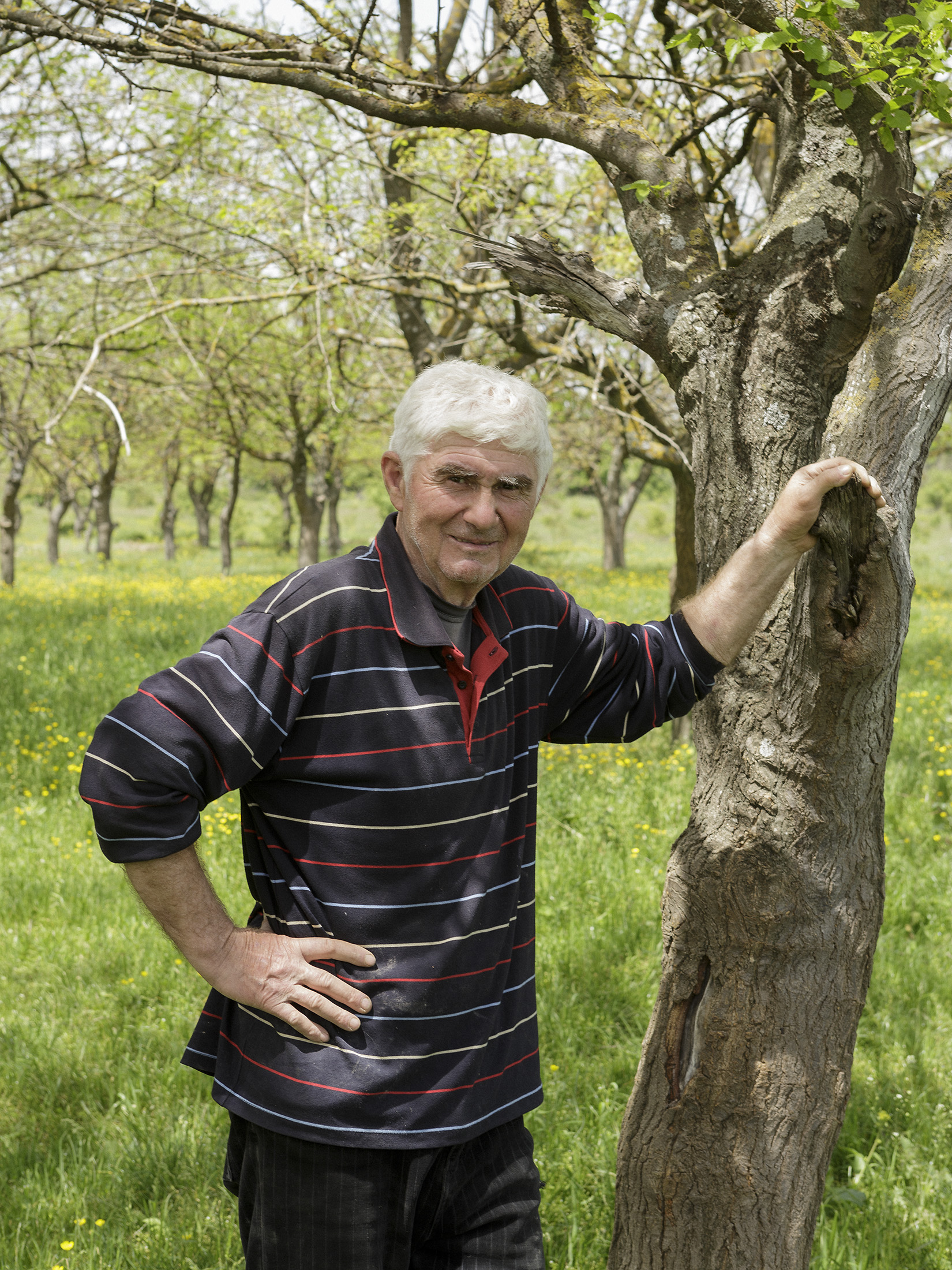
This farmer has yet the permission to let his cows on the occupied field.
„I am not planning to leave my house and I am not going to do so.
No way will I depart from this area. Whether or not they build a border.”
Elizbar and Dzhenia Mestumrishvili have already been through the trouble caused by having to leave their house and village. Now they have settled down in Jariasheni and — again — have come as close as possible to the border. Officially their garden is located in South Ossetia. And with it also their outhouse.
They are living alone in the big house at the border. It is fenced-in with a very old and broken fence. The coupe is caring for the two dogs and the chicken and managing their life in this tense situation. Elizbar presses his own wine in the basement. The poverty is obvious in the whole house. The only furniture in the giant living room is a table with four chairs. A curtain is hanging from the wall and the windows are covered with white bedsheets to keep the bright sunlight out. Random objects – like wheels from a car, a wooden box and a tiny shelf – are leaning against the wall.
The house is the closest you legally can get to the fenced border – the border lies 200 meter away. Standing in Elizbar’s garden you can see the house of their former neighbours who had to leave. He already went there several times to have a look at the border, but only in company of the police men who often come over to see if they are alright. Once a team of a Georgian news channel came over to make a report about the situation. He took them to the border and was happy about their interest. Another time a group of activists came to Jariasheni to make photos and get an insight. “These people couldn’t achieve anything”, complains Elizbar. “They were just annoying us.”
“In my opinion it’s not dangerous living in Jariasheni. We have been living elsewhere, where it was a lot different.” says Dzhenia. It is Sunday and she is wearing a summery blouse. It makes no sense to protest against the Russians neither to leave the village. They will not leave and the two are too weak to move again. They got used to the situation. So far they can sleep well at night although the door lock is broken.
In 1999 most of the Ossetians living in Jariasheni had to leave the border. Many of them were responsible for the arresting of the Georgian people. Even Elizbar got arrest for a few days once. It was when he did not have a clue about the course of the border. By now he knows it by heart. Today out of fear they are always staying in the house when the border is moved.
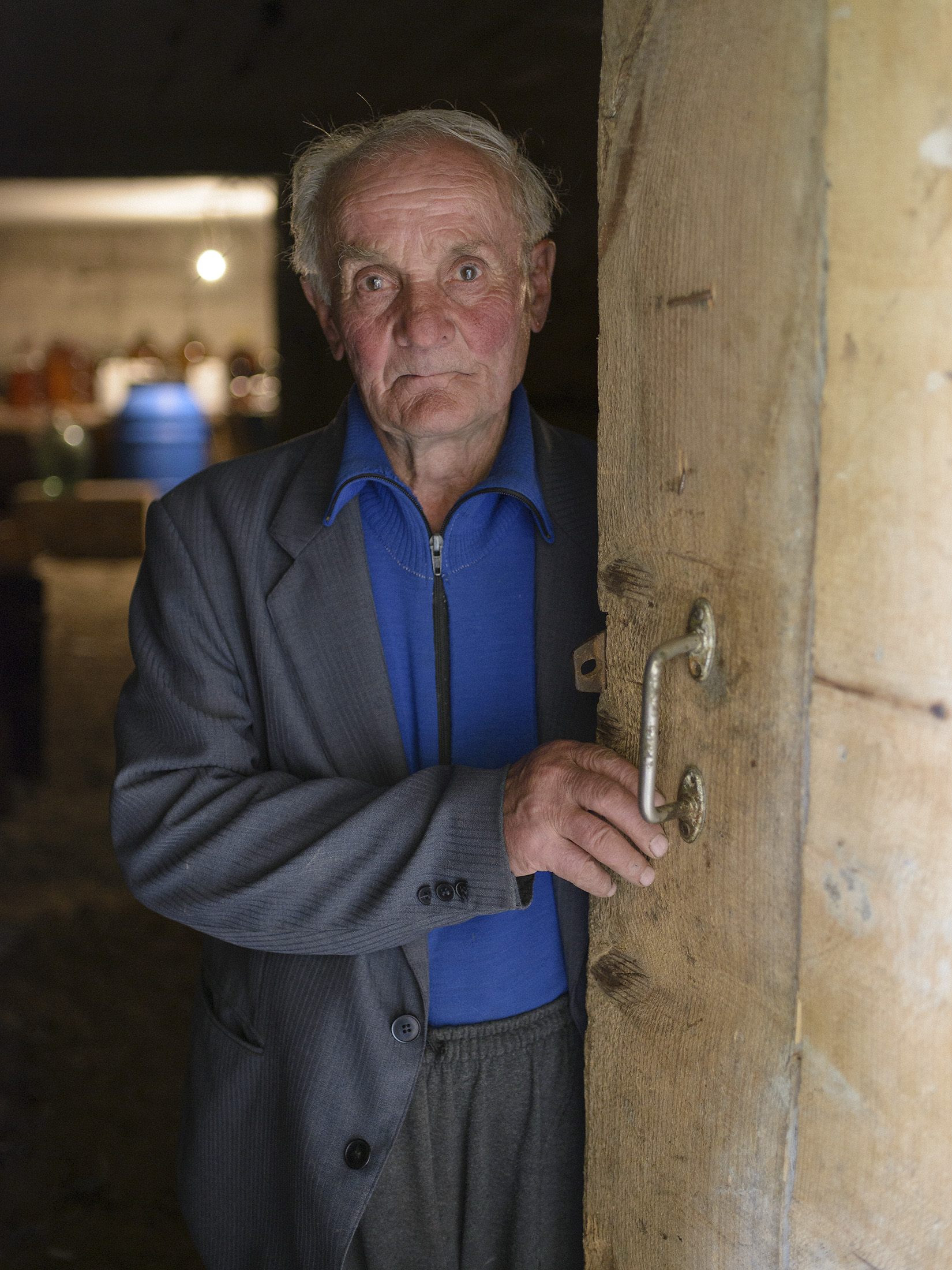
Elizbar Mestumrishvili already had to leave another village.
“It is not easy to leave the house. We have already lived in another village and were dispersed.
Even if someone would offer to help us move, we could not leave. The effort is too big for us.”

On the way to the marked border the police man is unlocking his gun.
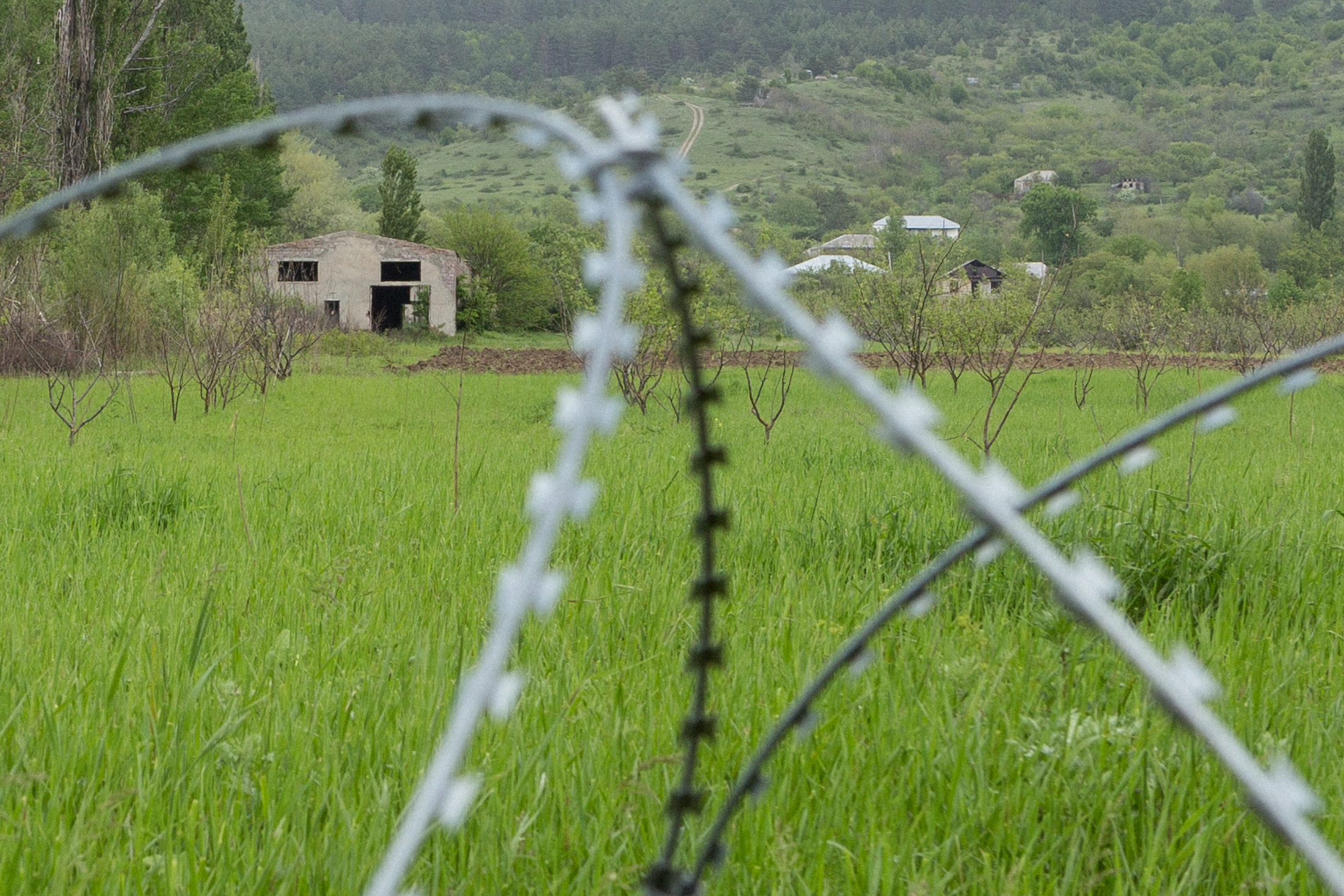
Only ruins are left behind where the people have to escape.
Behind the garden fence comes an abandoned apple tree garden. It is closed off by another fence. Trespassing forbidden. Only accompanied by the police. The walk through the garden leads to another house. It has the same ground plan as the house of the Mestrumrishvilis. But nobody is living there anymore. The rooms are empty. Only the wallpaper is peeling off. The windows in the second floor are covered with iron sheets. The entrance is ridiculously locked with a wire. From the upper floor you have a good view over the landscape. About 100 metres into South Ossetia is another abandoned house — it does not even has its windows anymore.
At this point you are able to see border and consequences it has on the habitants of Jariasheni. Right next to the abandoned building the Russians have rolled out the wire mesh fence. There you also see a sign for the first time. It has “Attention! State border! Passage forbidden” written on it and warns in Georgian and English. Coming from the other side it warns you in Russian. The firebreak a short while ago is here seen as the street connecting both sides.
Elizbar does not like coming here. It makes him sad to see how everything has changed. So he is leaving after a short while. It is not because of the Russians in this area. They are not disturbing the living at the border. In fact they are helping them where they can. The rest of the time he does not notice anything the Russians are doing. They are acting invisibly.
Elizbar is 75 years old, his wife one year older. By now they are too old to leave. Therefore they are hoping for the best.
Behind a big copper door stands the house of the local monk Nukri Kalashnikovi, 44, in which he lives with two further fellow believer and a woman. When he became a monk he changed his name into Beri Noe. In Georgian beri means monk. A dirty Opel stands in front of the house. Next to the number plate it has a Germany sticker on it. Self-made cheese is hanging from the washing line while a chicken and his chicks are squeaking in a wine box. “After the turnaround 1990 I have been to Germany”, tells the brother in faith Valeri Kalashnikovi enthusiastically. He likes to talk and does it a lot. His father and Beri Noe do not say a thing. They are just listening.
His ground also where the fruit trees have been standing was taken away from him. He lost 17 hectares of land. Only a little garden is left over. It is located on the other side of the path where the house stands.
The field was enormously reduced and only a little piece of land has remained. It is not separated with a fence from the former field – which still can be seen from the field. The occupied field is drying out. Through these restrictions it is getting harder and harder to provide oneself with enough to eat. Everyone in Jariasheni is facing these problems. They are living in poverty. Work on the fields is necessary for surviving. For most the crops are the only source of income they have.
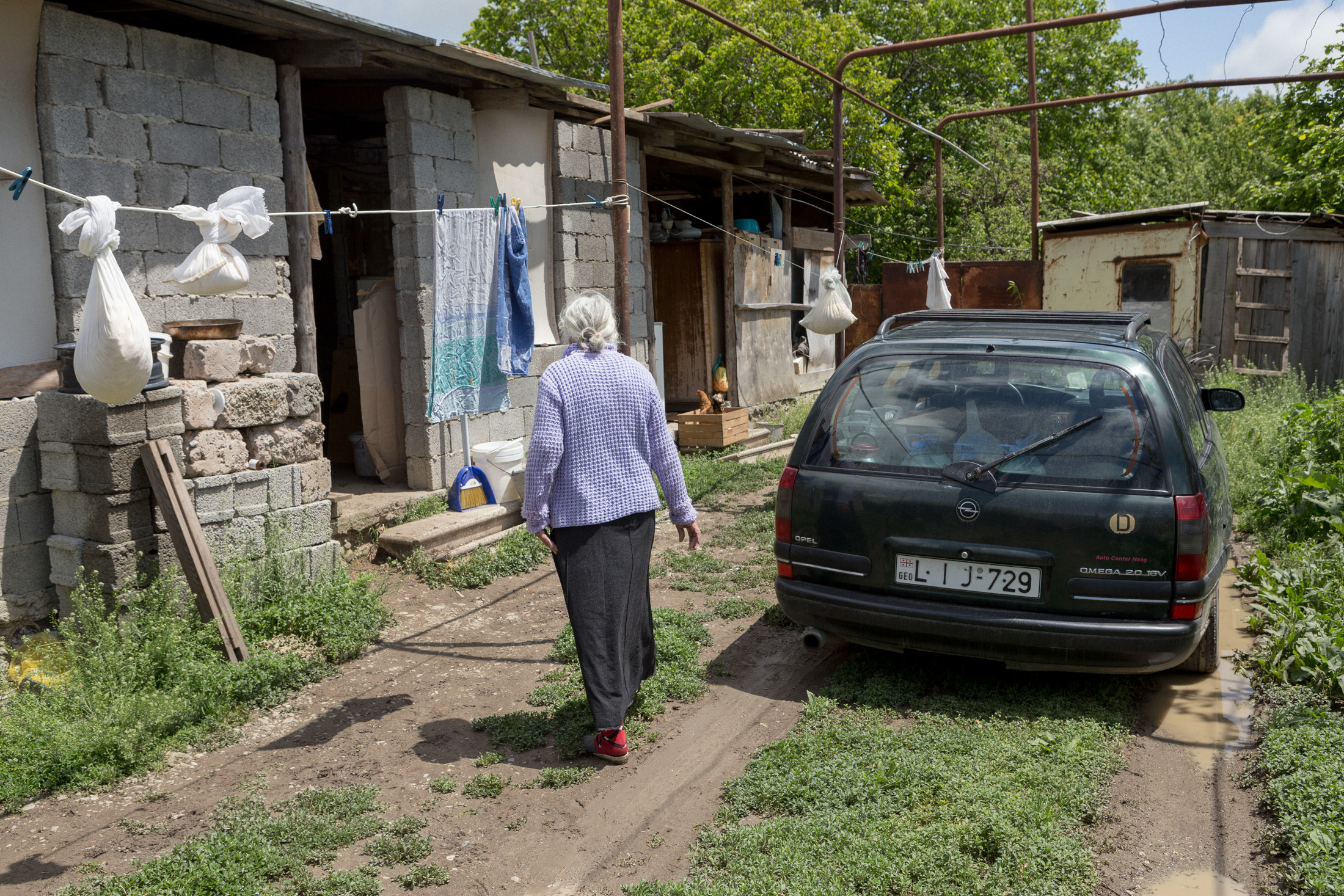
Most people in Jariasheni make their own cheese. It dries on the washing line.
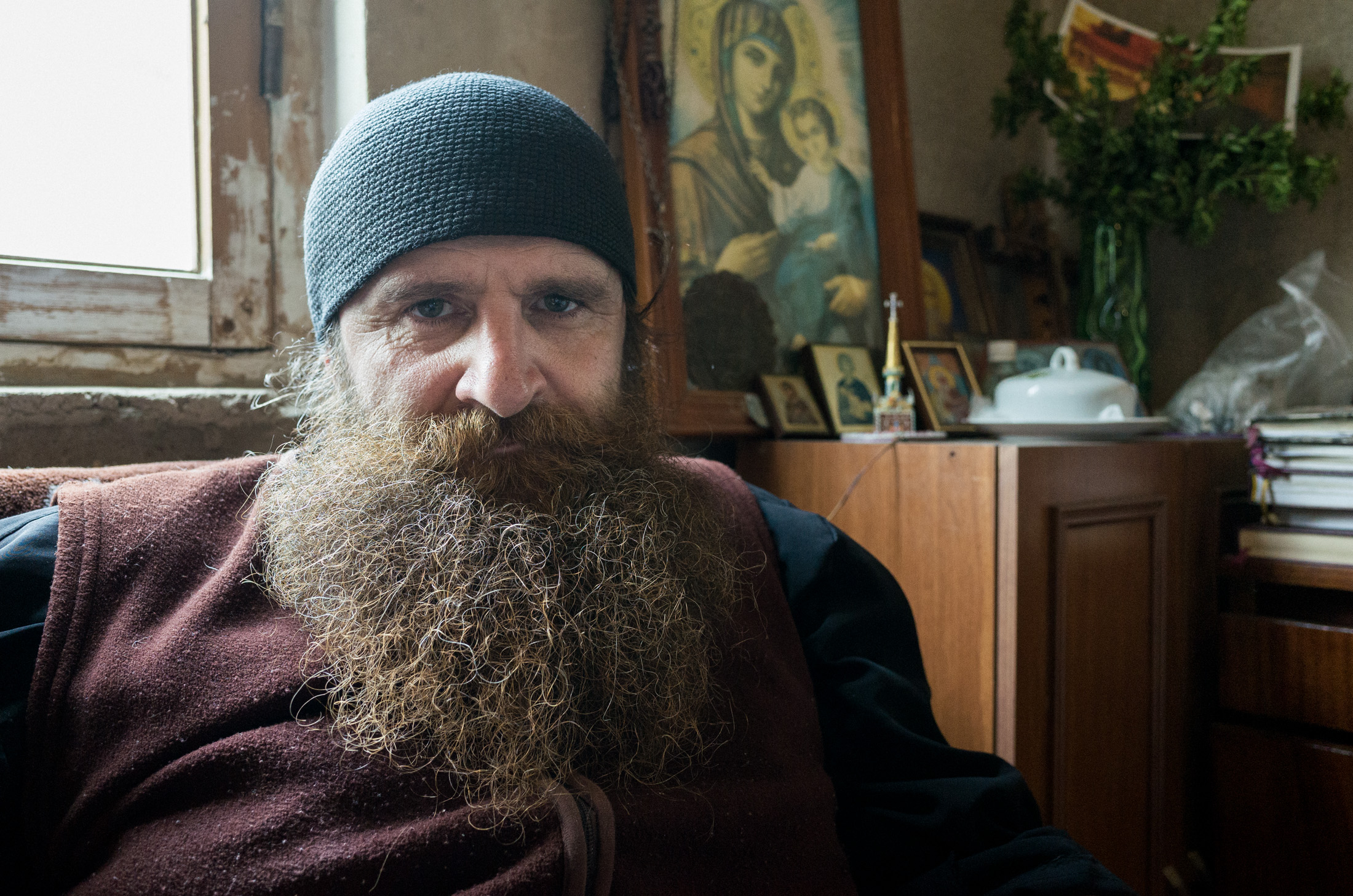
Beri Noe is holding the fair every week at the little church.
Next to the monk’s house lives an old widow. She has lost her husband and son in the war 2008. Since then she has to struggle along. She can count on the help of her neighbours and the other people from the village. They are helping each other. Still that does not mean that she has not to work on the field anymore. She is walking with a stoop because of the hard work. Dressed in black she is weeding the garden in the sun until she makes a break in the shadow of her house. Her basic inventory is partly placed outside of the house. Safed by a wooden roof and plastic sheets. A little kitchenette lines up with a sink and a little table. On a shelf are several cooking utensils. On the upper floor countless corncobs are lying on the floor in order to drying.
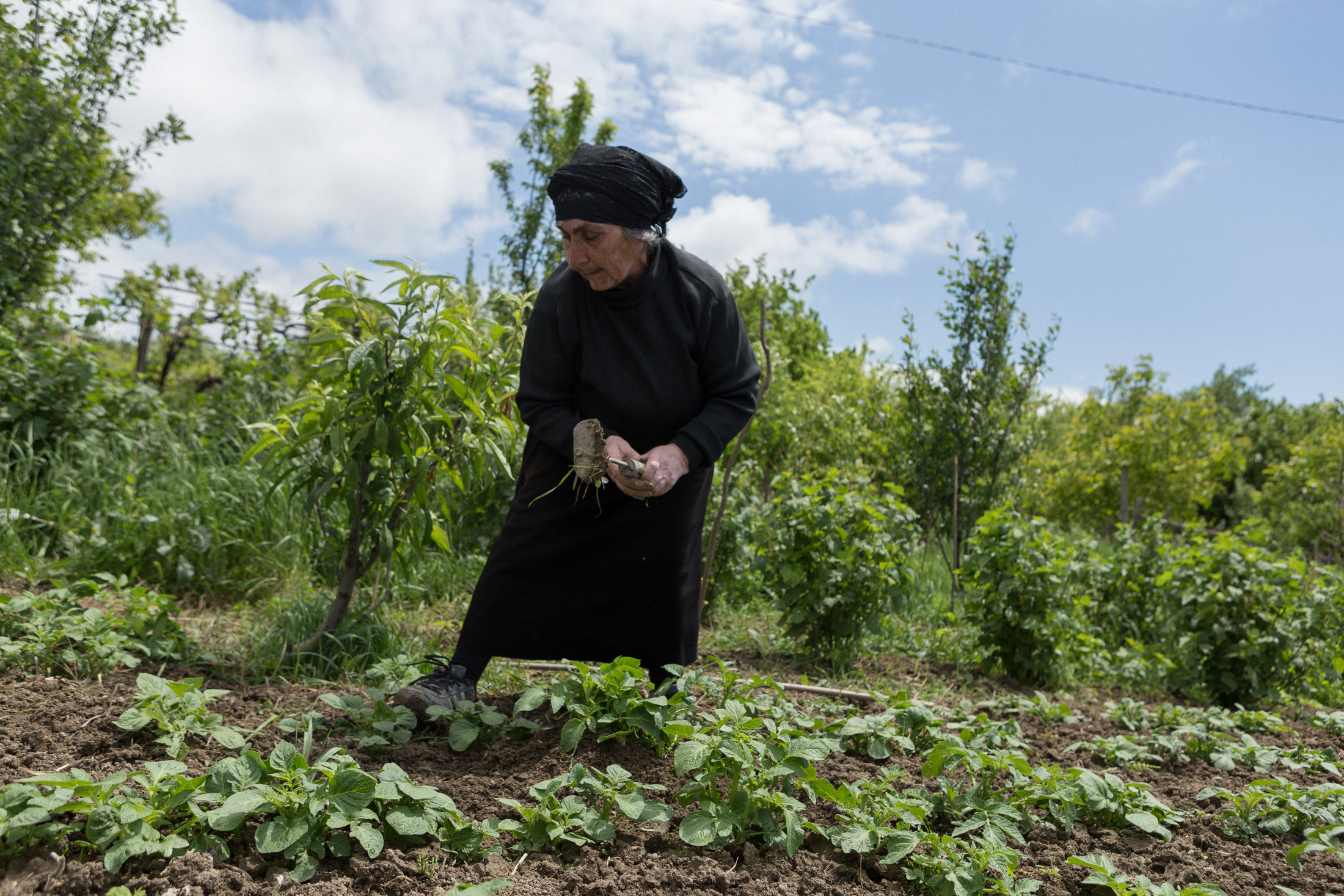
After her husband and son fell in war 2008 she is one her own with work and the house.
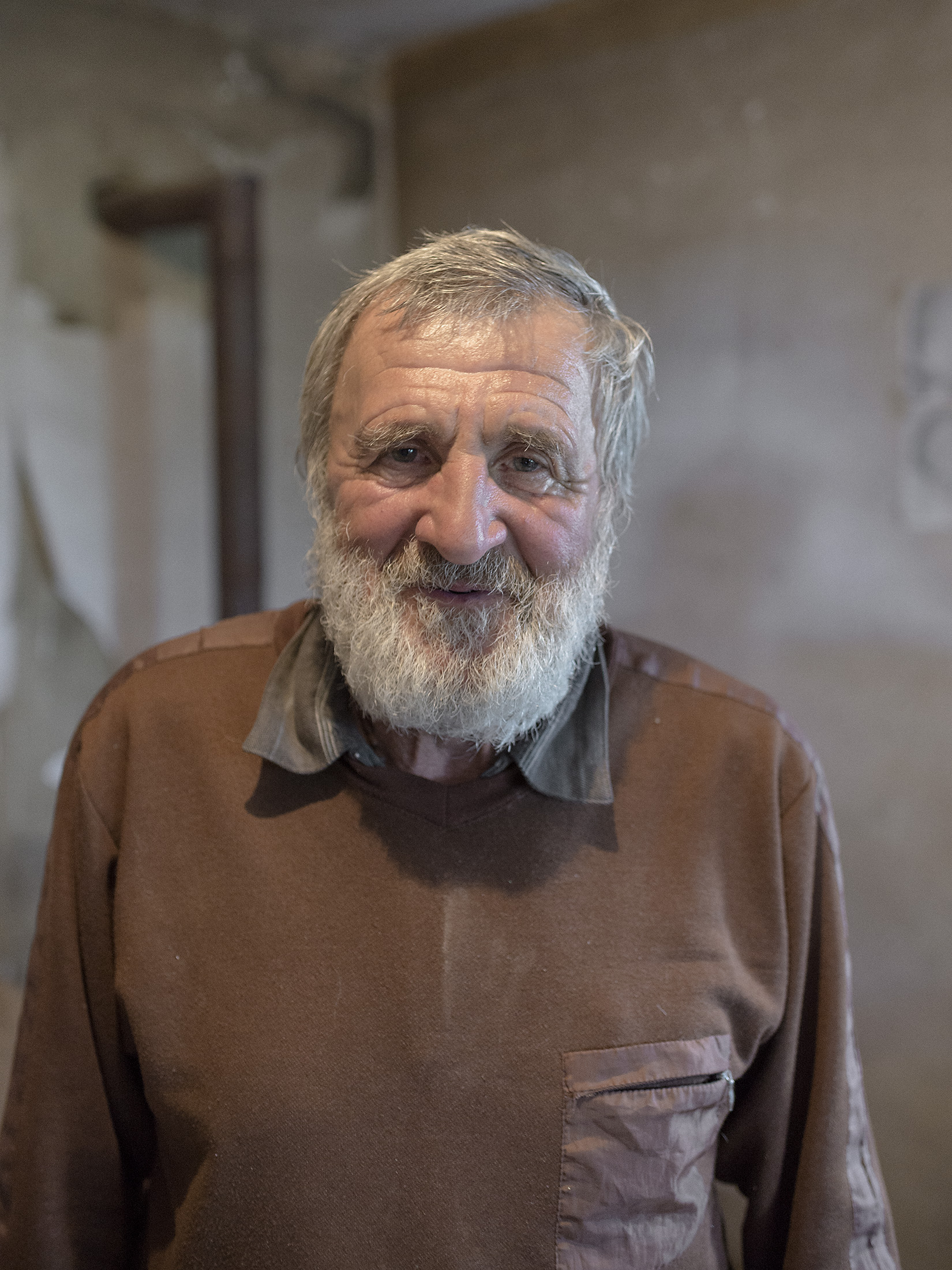
Valeri’s father unknowingly passed the border and was arrested for a few days.
„The most important thing is you are human.
Whether your are Russian, Ossetian or Georgian.”
The border movement is responsible for the poverty of the people. Like you can see at the monk his belief in God helps him in his despair. He and his brothers in faith cannot do anything to prevent themselves from what is coming so they see God as their only chance to get through what is yet to come. Next to the couch in the living room Beri Noe has arranged a prayer corner with pictures of saints, books and a cross. The beardy monk is wearing the typical brown and black habit and a cap. In comparison to other houses in Jariasheni this one has a lot more furniture, it reminds of a common house like you are used to it in Western Europe. The curtains at the windows, many carpets and blankets make it very comfortable. Even a budgie has found a place on the living room table. Every week they all together go to church at the market place. Valeri’s brother is living in the monastery for 15 years. Valeri preaches peace between the people. The nationality of someone does not have a meaning for him. What has happened between Russians, Ossetians and Georgians shall never happen again. In his opinion you should not only be friend with just one nation, like the Georgians for example. There have never been hostilities between Ossetians and Georgians in Jariasheni when they were still living together. The Georgians always had a good relationship to the neighboured village Artsevi – now behind the border. Some Ossetians are still living in Jariasheni.
Valeri’s 75 year old father was arrested a short time ago because he was on the other side. In the eye of the Russians he had make a mistake although he unknowingly walked over it. Luckily he was set free shortly after and could return. Not every prisoner can say that. Often the Russians are very moody and it always depends on their daily mood whether they arrest you or not. Nevertheless it is a lot of stress and unpleasant – even when you are not arrested. Like all the other people, the police men are brothers too. They are supporting the people a lot and spend much time in doing that. The effort is big, but it is worth it. “I have never been to Tblisi, and I do not want to go as well. I stay with my people in Jariasheni”, tell a police man. He himself has served in the 2008 conflict. The police men are friends. Valeria has a lot of respect for them. “They are in a much more dangerous situation than us”, he tells while he is pouring his self-made wine.
Only a few cars are driving around in Jariasheni, so most of the time it is a police car passing by. Therefore the sound of wheels on the gravel already gives the people a safe feeling.
Many people already have faced what is maybe yet to come in Jariasheni. Two refugees from the war 2008 give an interview. They tell what they have experienced on the run and in the time after. Also what they are hoping for their personal and Georgia’s future.
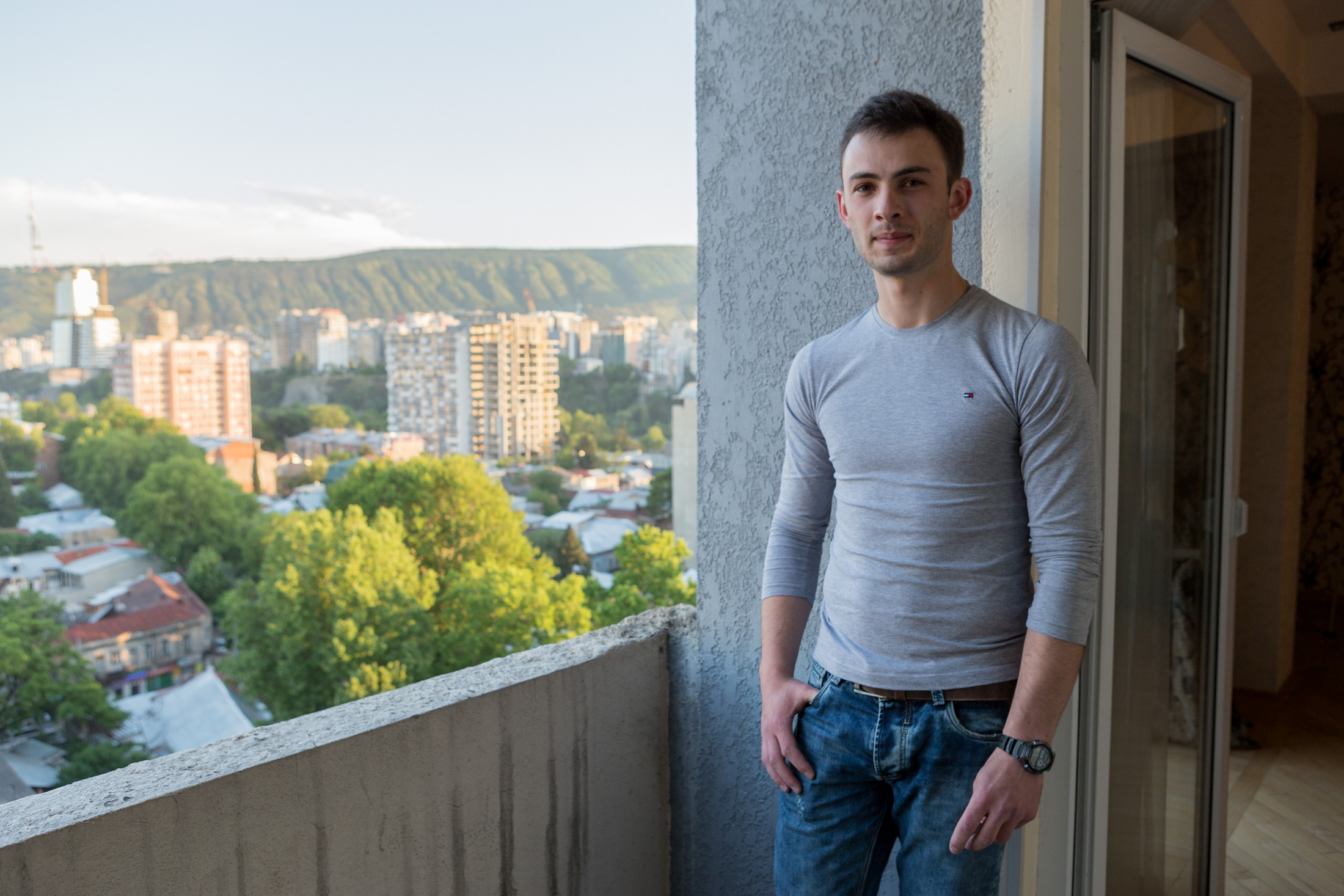

Nika Markozashvili, 23, has lived in the village Vizi which belongs to the puffer zone between Georgia and South Ossetia. In the war of 2008 the house of his family was destroyed and they had to escape. Today he is living in his own apartment in Tbilisi. He studies economy in the 4th year.
You have lived in Gori. When did you have to leave the house?
“I left 4–5 years ago when I finished school. It is hard to get a proper education, therefore I went to Tbilisi. I grew up in a village in the buffer zone. Living there causes a big risk because terrible things happen in this area. The village’s name is Vizi. It is the last controlled by the Georgian side. There are many Georgians soldiers who try to punish Russian and Ossetian separatists. The occupation line always is very dangerous. You easily can get arrested.”
Was your family the only one who left?
“No, everyone who was Georgian escaped the village but some returned. It is sparsely inhabited again despite the dangerousness. Many people are motivated to spend their life there again.”
Can you imagine Russia as a partner?
“No way. Politics control the economy therefore an economic partnership between Georgia and Russia never will be stable. We cannot determine the opinion and mood of Russia. We cannot predict whether they will allow our product on the markets. Their embargo (prohibition of Georgian productions) was fine, I guess. It motivated us to look for alternative markets.
In addition to it I am not able to relate to Russia as a political partner because Russia occupied Georgia all the years. For example the war in Abkhazia and the last one 2008, I myself have witnessed.”
What are your memories of the war?
“I can clearly see the 7th of August. I must have been 15 years old. That was the day my family and I were in Gori and my aunt was in Vizi. We decided to take her and other relatives with us. The road from Karaleti to Kirzins was full of soldiers. In the morning war started.”
Did you now at this point that you would have to leave the village forever?
“First you don’t realize what is happening. Yet after a short time I could analyse the situation and I knew it, yes. We also had to escape Gori because our house was destroyed by a bomb. You can see it on video. Journalists from the channel Rustavi 2 have been there – they have filmed the explosion. It is much known. A friend of mine with whom I went to school was injured. He was 15 years old like me. I have seen how his mother died through the bomb.
Another bomb luckily only was a blind shell. Otherwise much more people had to die that day.”
How have the politics of Georgia changed since 2008?
“In my opinion a lot has changed. The worst are all the victims. Both civilians and soldiers. Many international organisations helped us. For example in Vizi: USAID, GIZ and a German foundation brought food, cutlery et cetera. 2007 was the most successful year for the economy. In 2008 everything was different. Politically, militarily and economically.”
You said it is dangerous on the occupation line. What is going on?
“People getting arrested. A cowherd was seen beyond the border and he had to stay in jail for three days. He had to pay for his freedom. Other people I know were in the forest close to Gomi looking for mushrooms. Not even knowing they were getting to close to the border. I know for sure these people are not behaving wrong. In fact they are nice. I had an interview with an ex prisoner because I was comparing Ossetian, Russian and Georgian systems for university. They were not tortured or anything. The condition in the jail was much better than here in Georgia.”
How is the government of Georgia reacting towards these problems?
“It is not enough. There is a lot work to do. The politicians have to make decisions and the people need to take the initiative. Especially the young people. And some day the people will say everyone is part of Georgia — even in Abkhazia and South Ossetia. Still they cannot say it out loud because the system is too strict.”
Gaioz Chavchavadze, 22, had to leave his hometown Avnevi when he was 14 years old. The village is located 25km in the west of Jariasheni – now behind the border. He lives in Saguramo, a shared flat, with other refugees in Tbilisi. At the Free University of Tbilisi he studies social economics and management.
When did you have to leave your house and with whom?
“It was in the conflict in 2008. I left my house on the 8th of August together with my parents, my grand-parents and my older brother.”
Have the entire people of Avevni left the village?
“Everyone did. The village was completely empty. Some international organisation, the UNO I guess, helped us move. They provided black jeeps and sometimes busses to evacuate the village. Me myself I have left with my own car.”
What are your memories of the war? Have there always been conflicts and were you surprised of what has happened?
“There were always conflicts in the area where I lived, so the only surprising fact was the size of the conflict. We were used to noise and gunfights – that was nothing new to us. But when we finally had to leave the house on the 8th of August (the official beginning of the war) I could hardly realize what was happening.
We thought we were driving to Borjomi and when the situation would calm down we could return. Therefore we did not take any furniture with us. Just one bag with clothes.”
Do you know anyone who has died?
“Yes, some of my neighbours. But luckily no one from my family.”
What was your profession back then? Did you have plans for the future?
“Even then I went to school in Tbilisi. I had several plans. We had a mill in the village and my family were cultivators: They had many hectares of field and I also was planning to develop in this direction. I had a good educational background in agriculture. We had the only mill, so my family was quite successful and our earning were stable.
The qualification of my parents guaranteed a good life. It was not so hard to adapt the new situation and reality.”
What do you think about the current relationship between Georgia and Russia? Can Russia be a potential partner for Georgia?
“No, I could never imagine Russia as a partner for one simple reason: In my village there was a building of the Russian soldiers of peace. We often were in contact because they were sitting on the only spring of water. We had to go there to get our water. I never connected these soldiers with peace – I always felt danger in the presence of them.
Sometimes they prohibited us from leaving the village and driving to other places. It was more than once in the news but then easily forgotten after. The Russians are dangerous and I could never respect them as equal. I can’t trust them. We are in a cold war situation and there is a giant enemy against us. In case of escalation we have only little chance to accomplish anything.”
What about the presence in the media? Is the current situation an important theme in the news?
“It is only in the news when there has been a new border movement. And the reports disappear faster than they appear. Still there is no stable protest against everything that is going on. I still know many people who live in occupied villages and for them the events are part of their daily life. They are facing the same situation like me 8 years ago. The problem is still not solved.”
How have the politics of Georgia changed since 2008?
“The only thing that “improved” is the fact that the war informed the world of the existence of Georgia. It is not only a state in the United States of America. And apart from that point: Only negative developments. If there had not been the war the relationship of the people on this side and beyond the border would be much better. My parents, my relatives had a good contact to the people on the other side. For example the grandmother of a friend of mine lives in Tskhinvali – the capitol of South Ossetia – she often visited. She even had house on both sides.”
So the Ossetians are not the enemies? Only the Russians?
“That is a one sided assessment. I cannot easily say that. I only can say that I imagine an open and faithful communication rather with the Ossetians than with the Russians. The Russian definitely is negative, an occupant. I do not want to talk much about history but the reason for the conflict was an awful attitude towards each other. And Russia plays the guilty part. Georgia was part of the Soviet Union for 70 years, 100 years in the Russian Empire. This cultural border has formed the empire.”
What are your plans for the future?
“I want to stay in Georgia and become part of the Ministry of Defence. It is important to work in this section– especially after the war. Not because of any military feelings or revenge and vengeance. Not at all.
You do not feel safe in this country. While we are doing this interview people in Jariasheni or Dvini get stolen their cows or ground and are arrested. Sleeping well has become impossible. I’m sorry for that. I quit war and violence. I prefer peace and I want to achieve it in Georgia. I’m scared that if people leave Georgia and find out that it is possible to have a safe life in Europe they’ll never come back. I don’t want to leave this reality.”
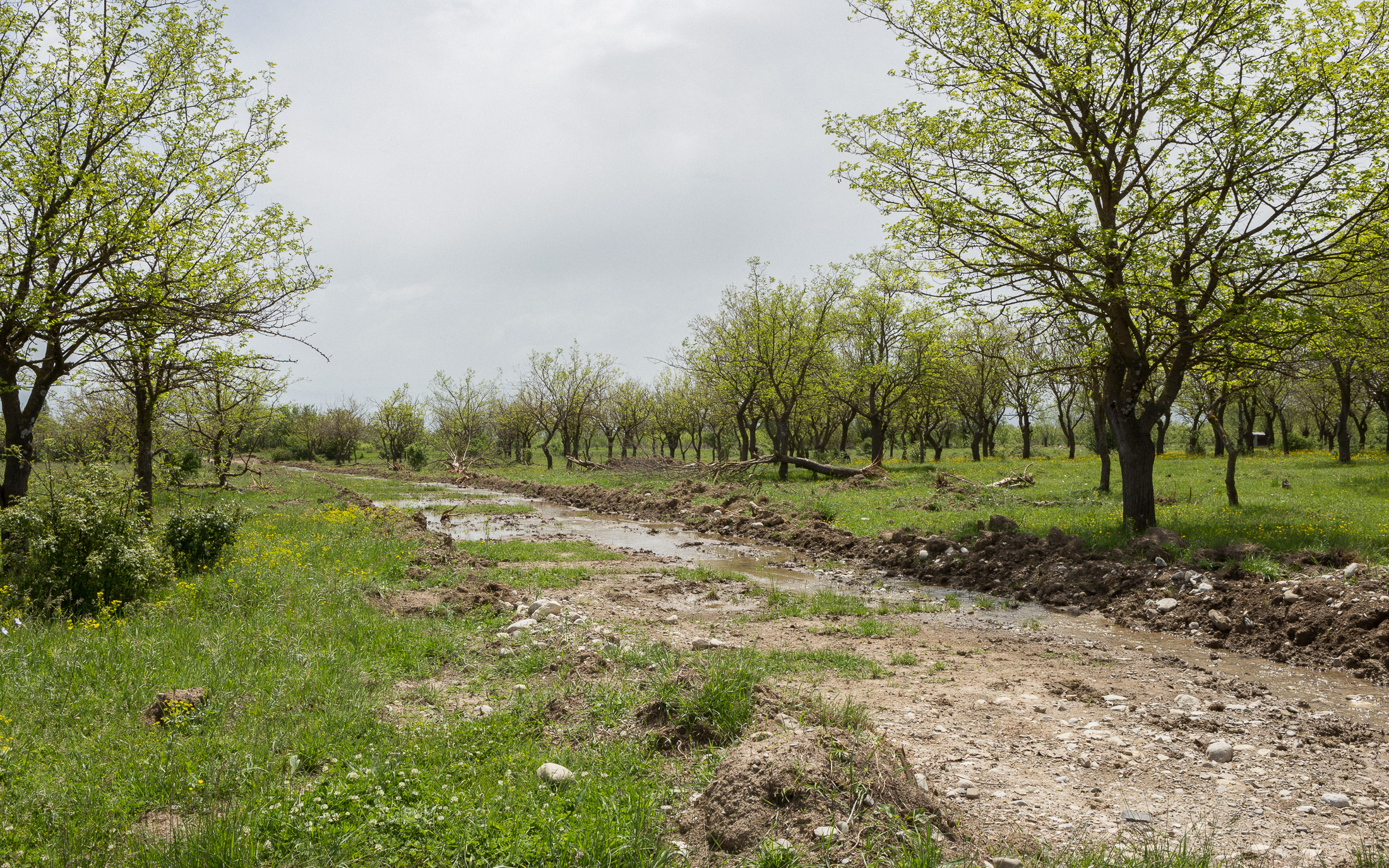
© Christina Stollenwerk and Robin Wasserfuhr // special thanks to Teona Sekhniashvili

